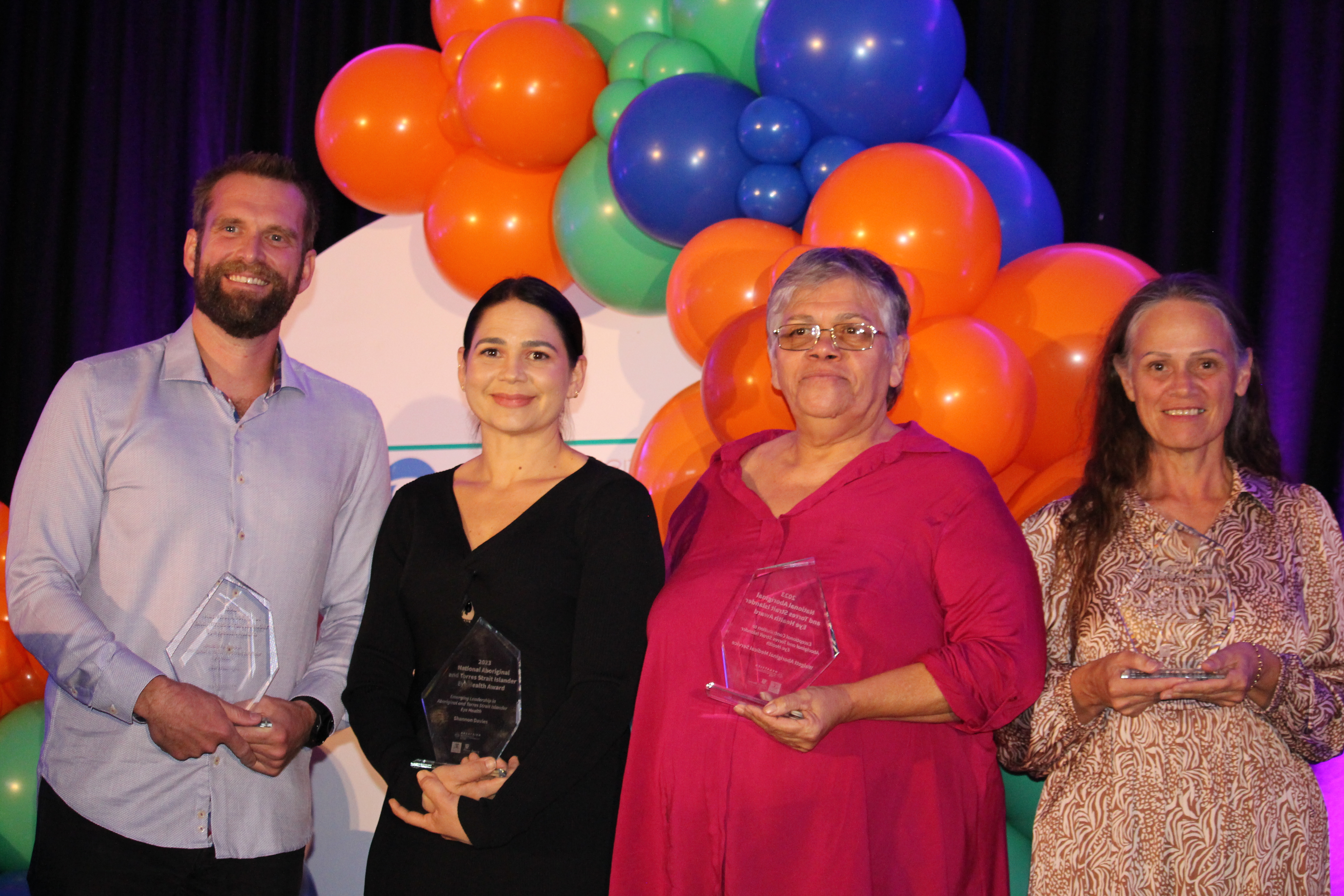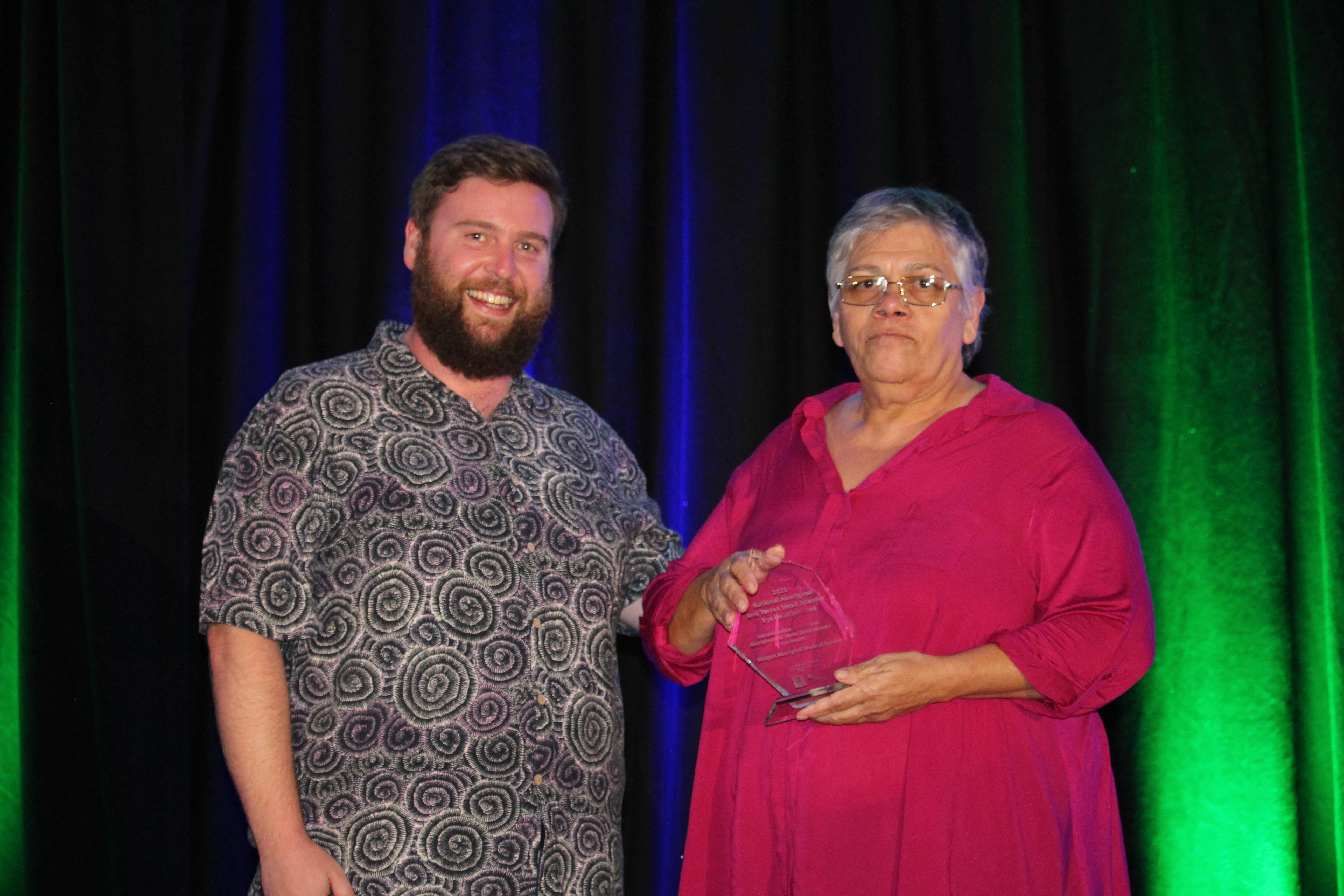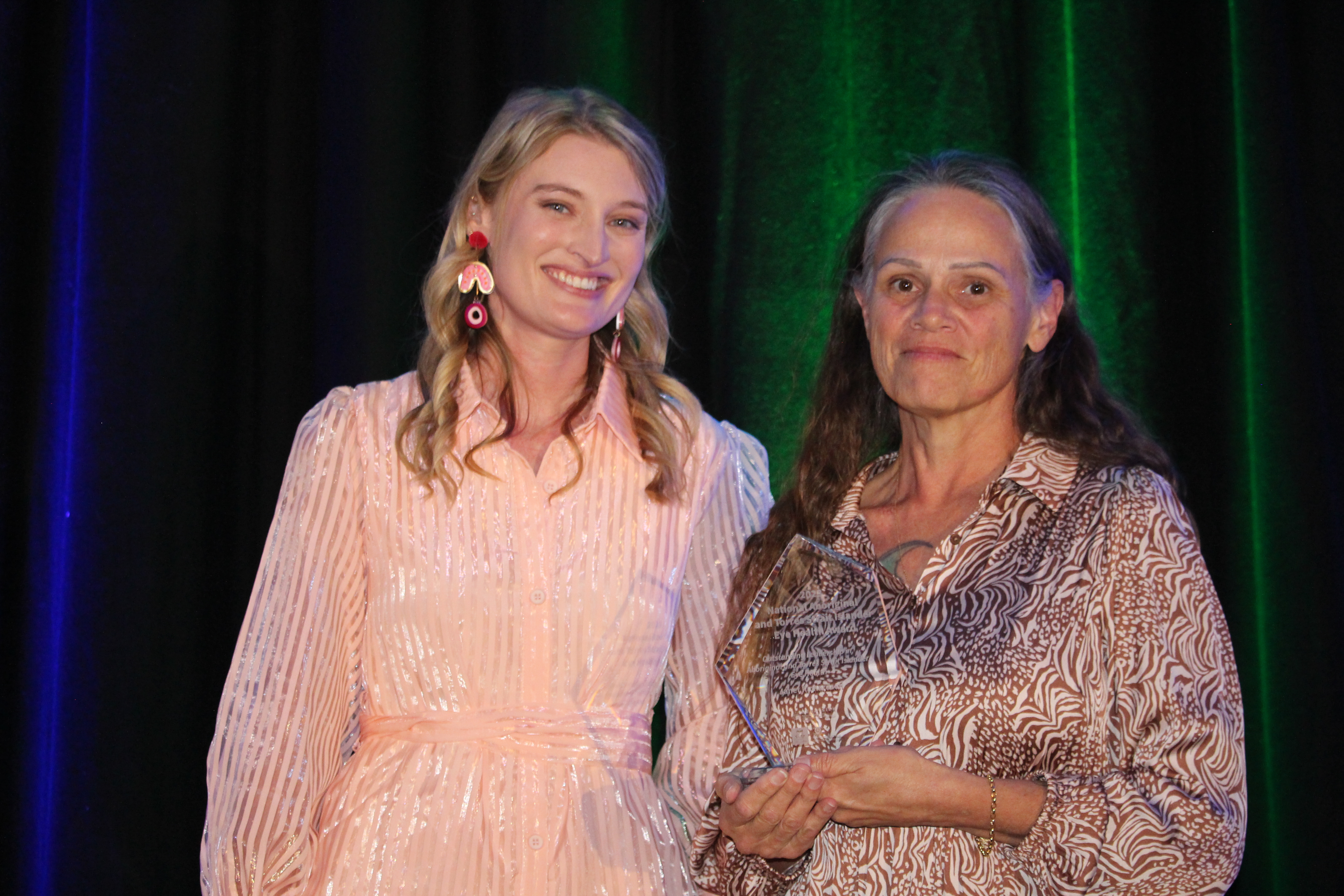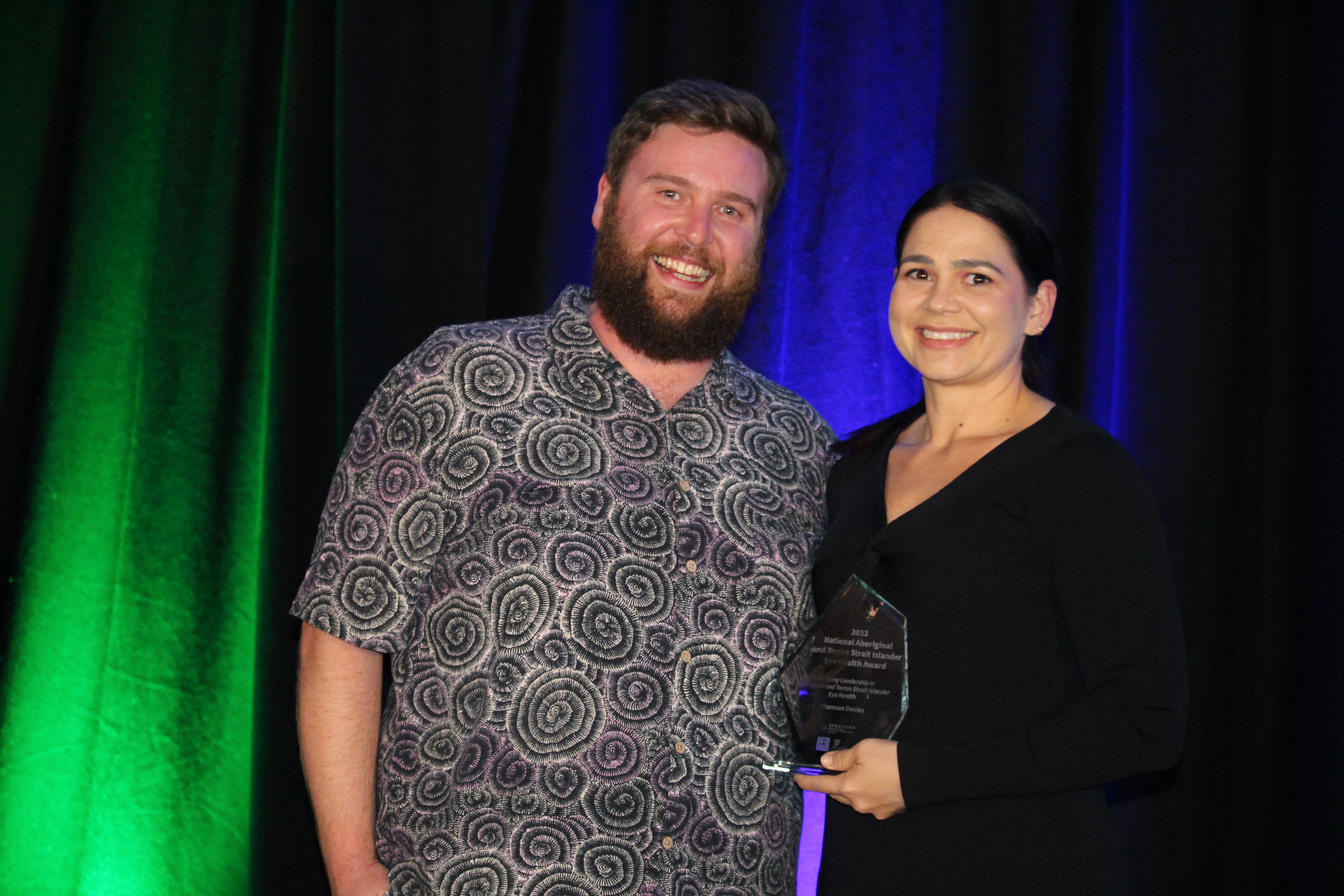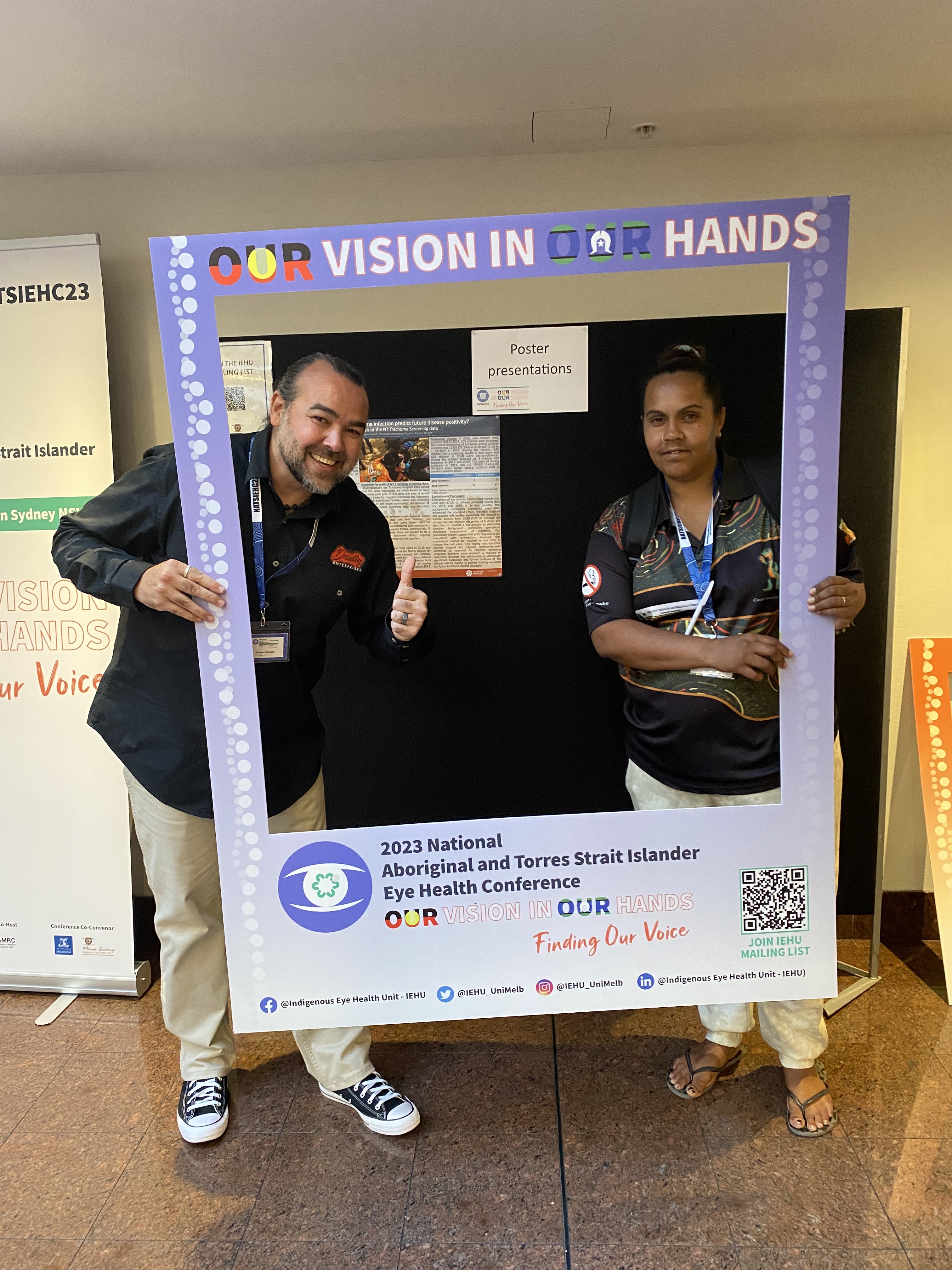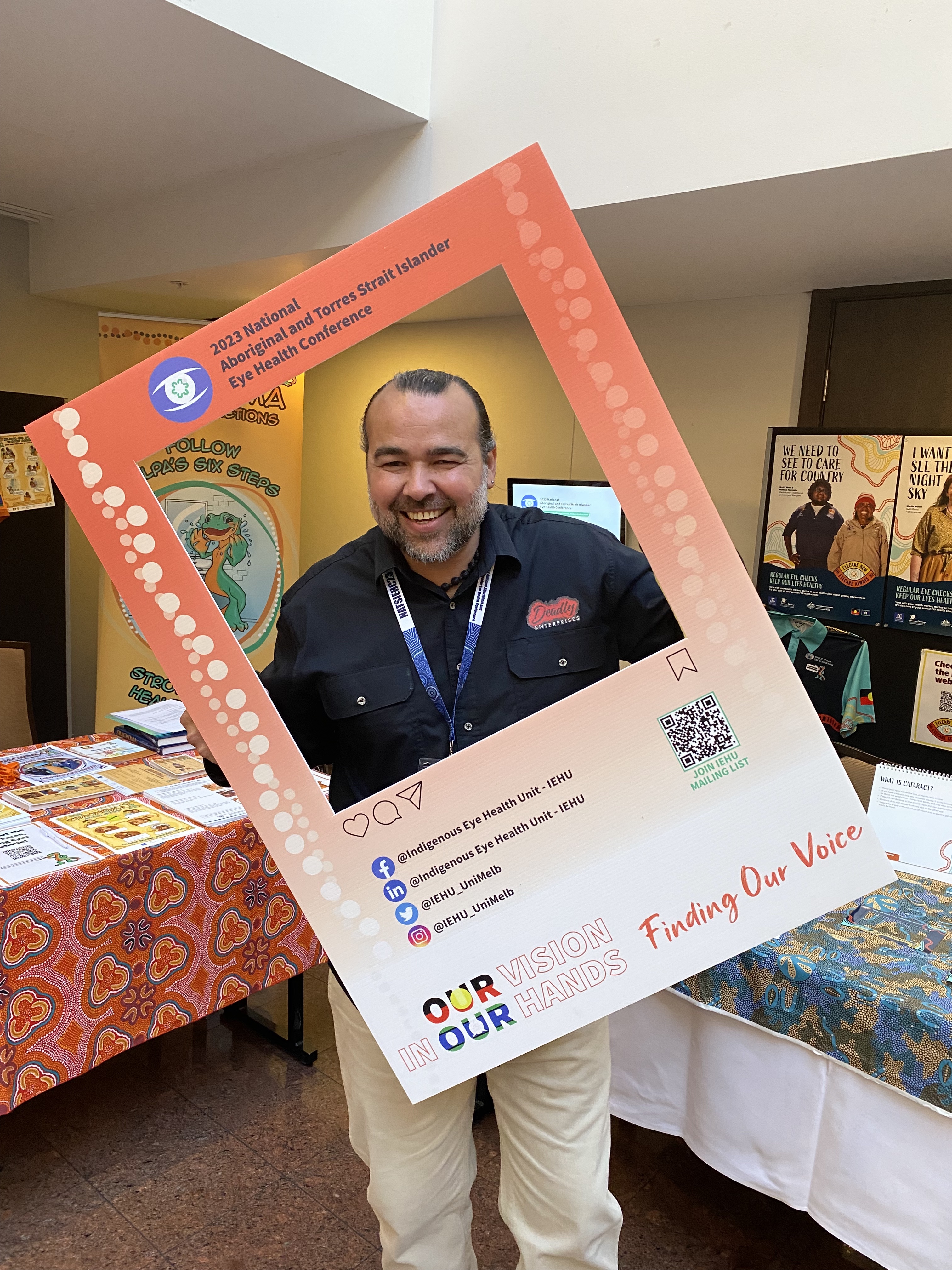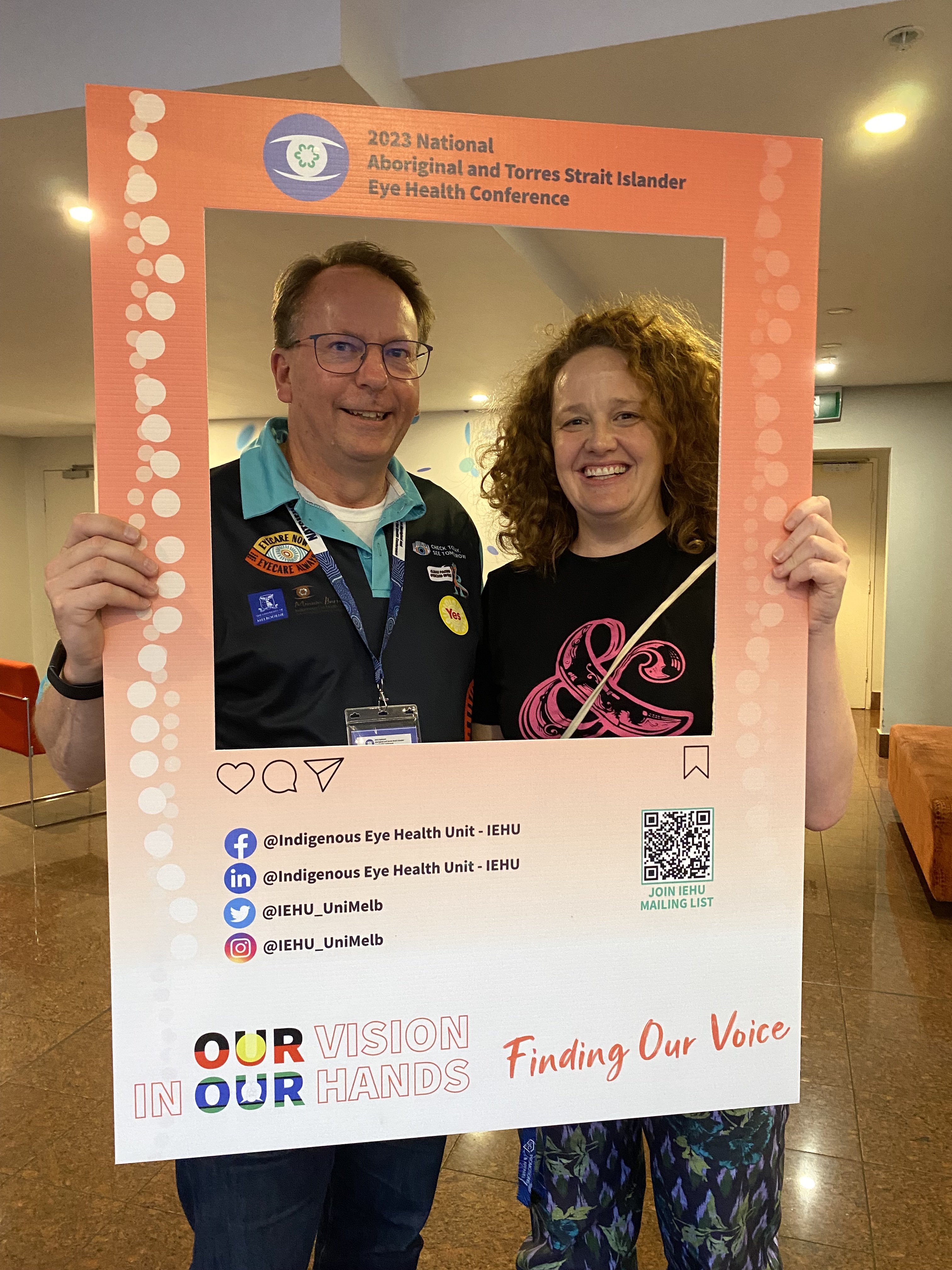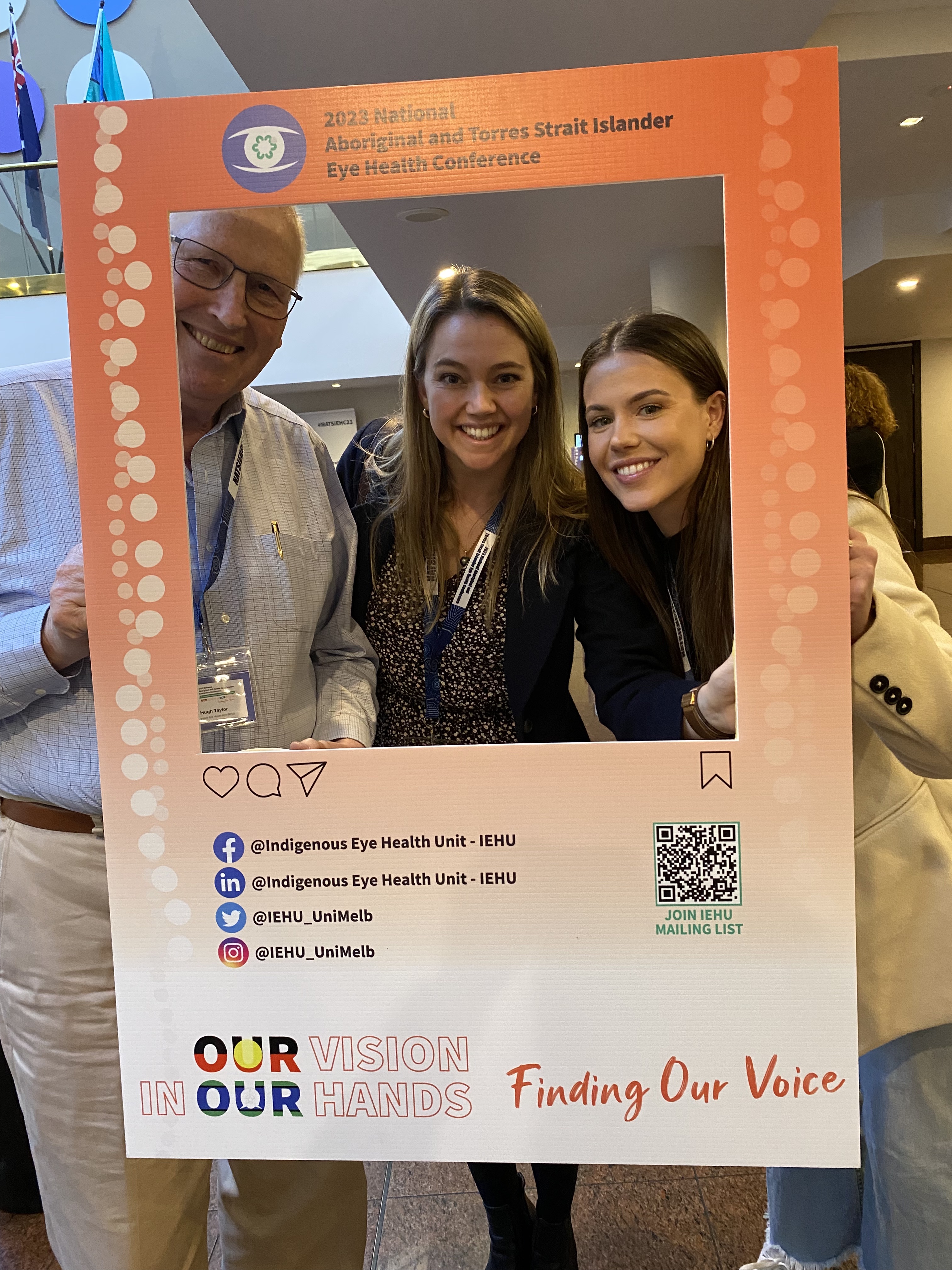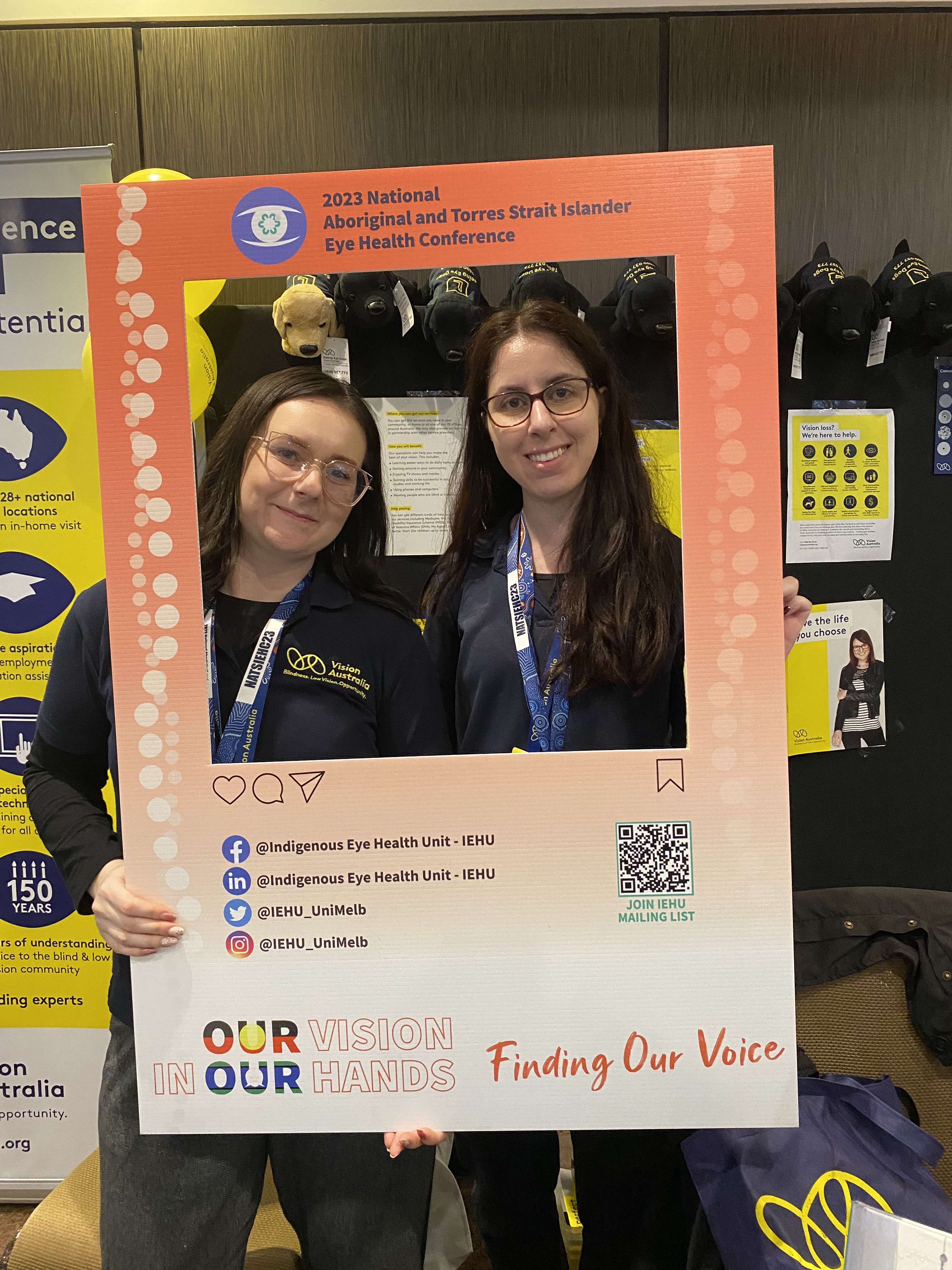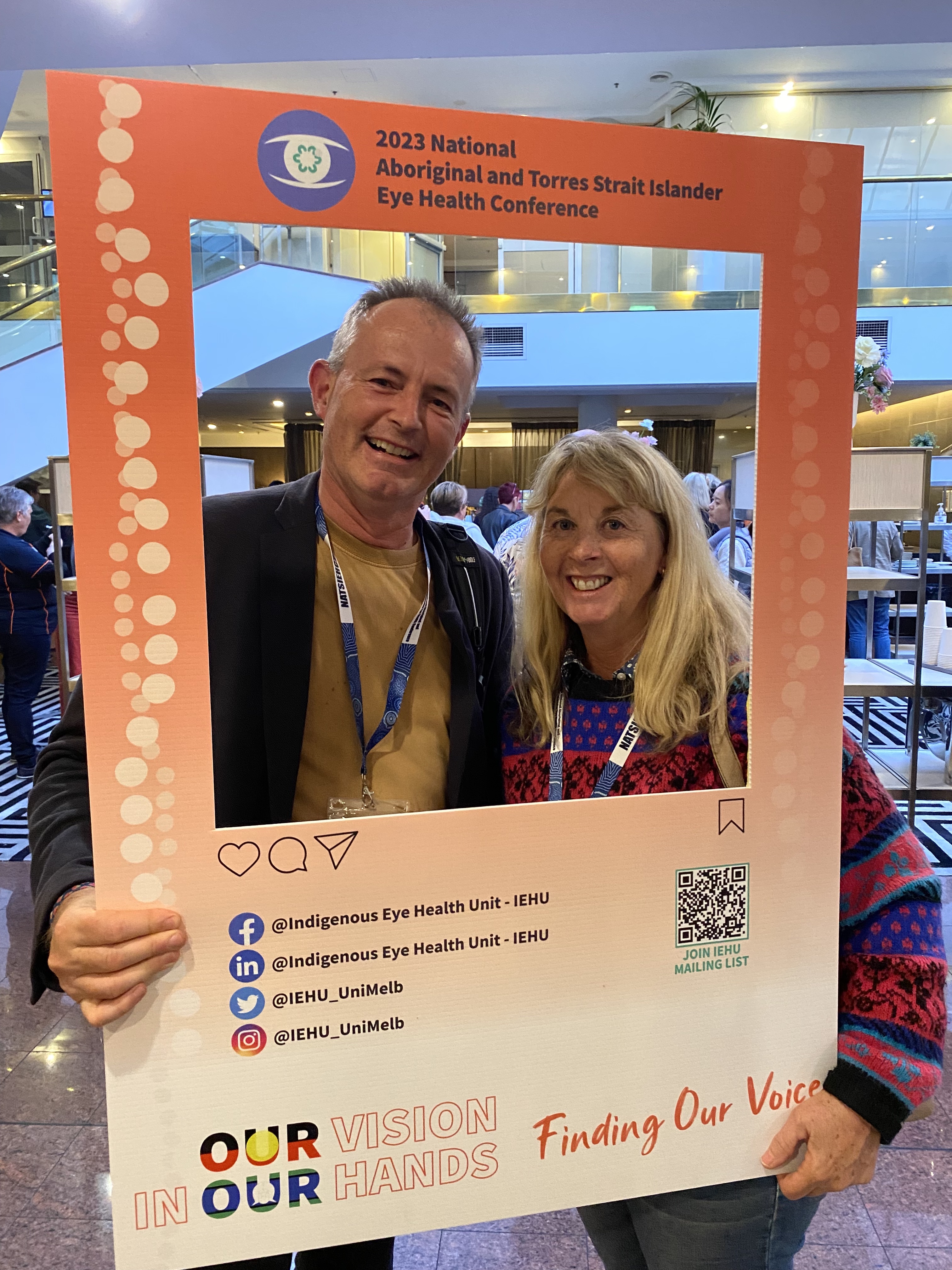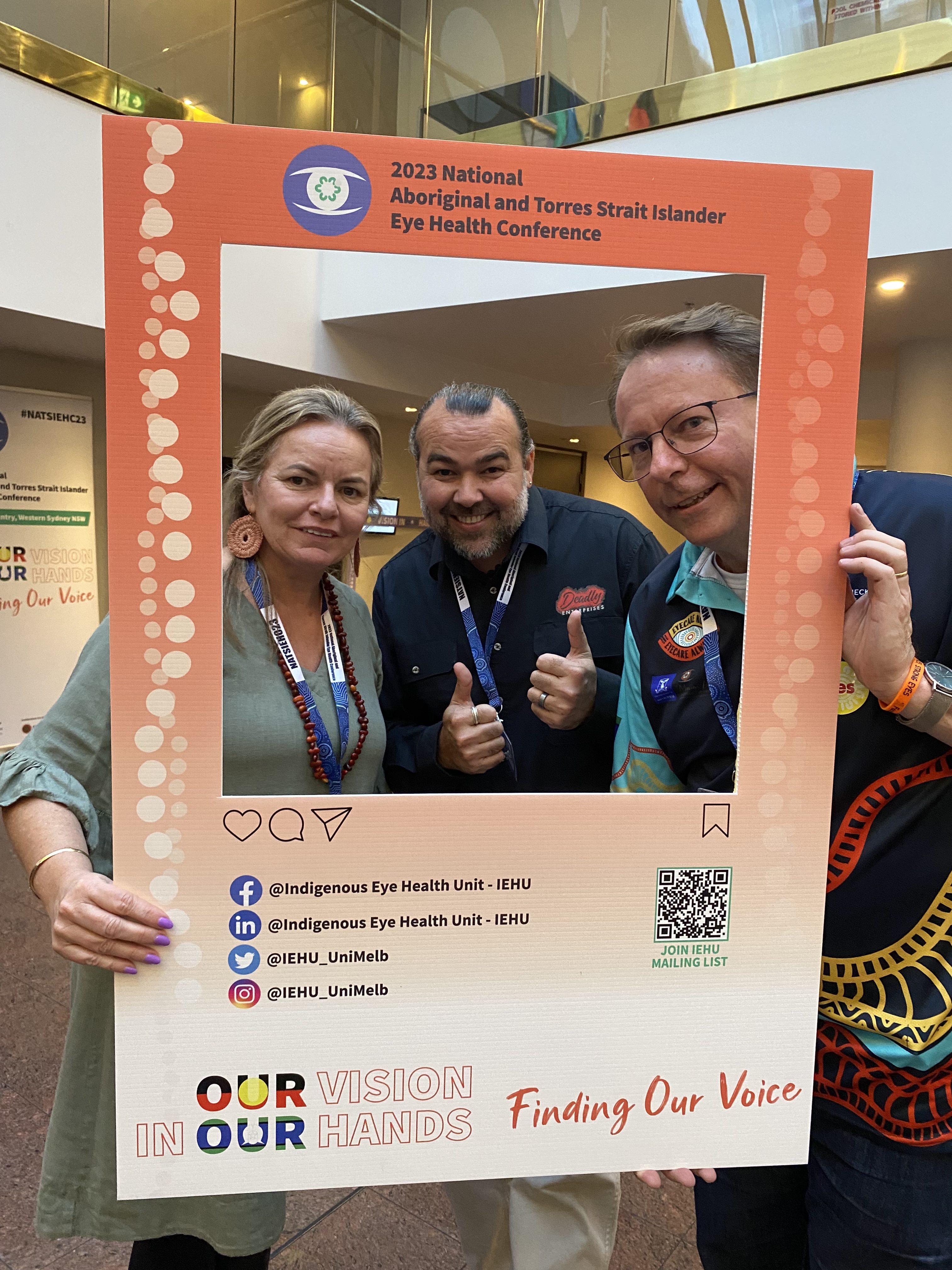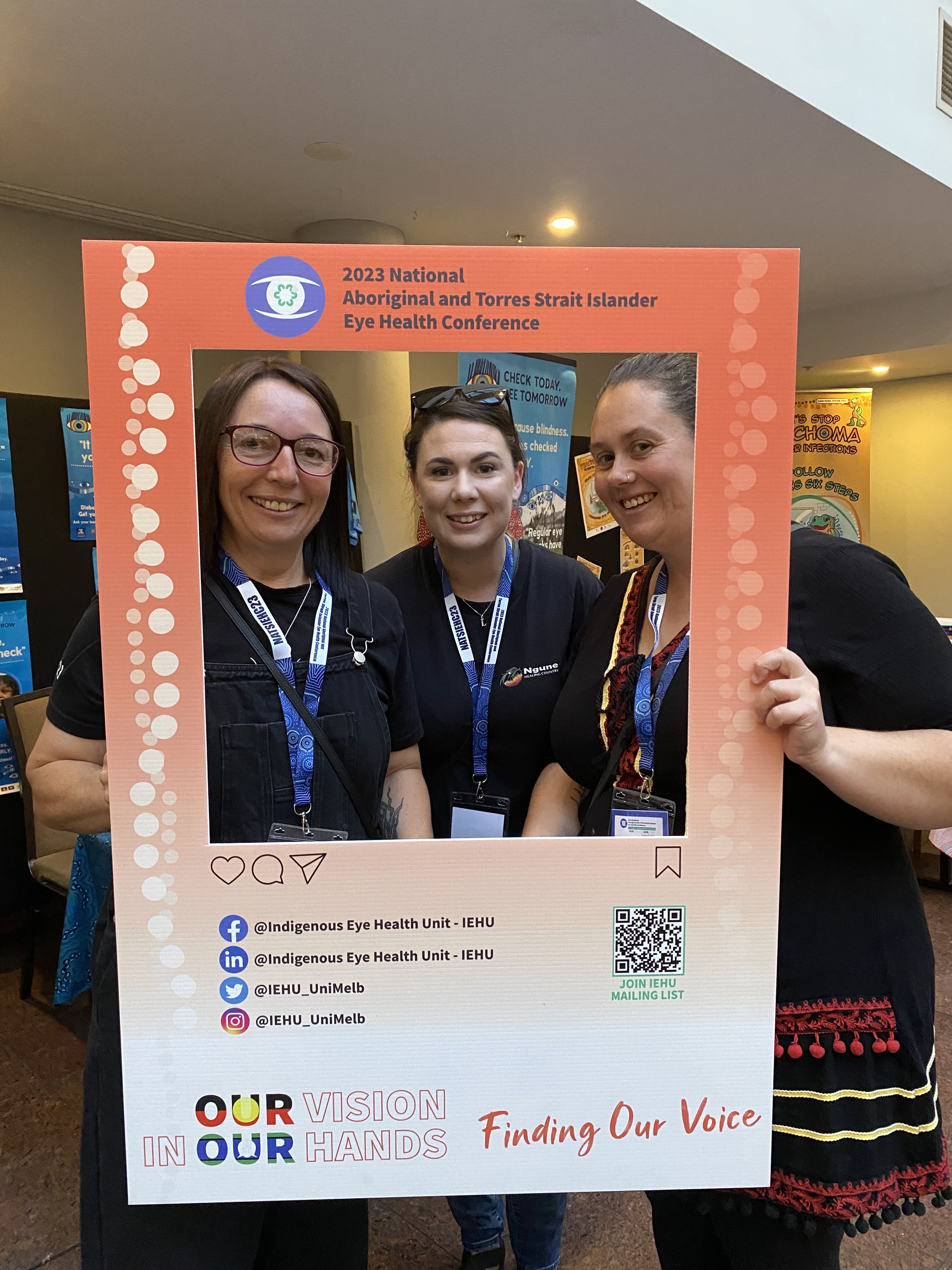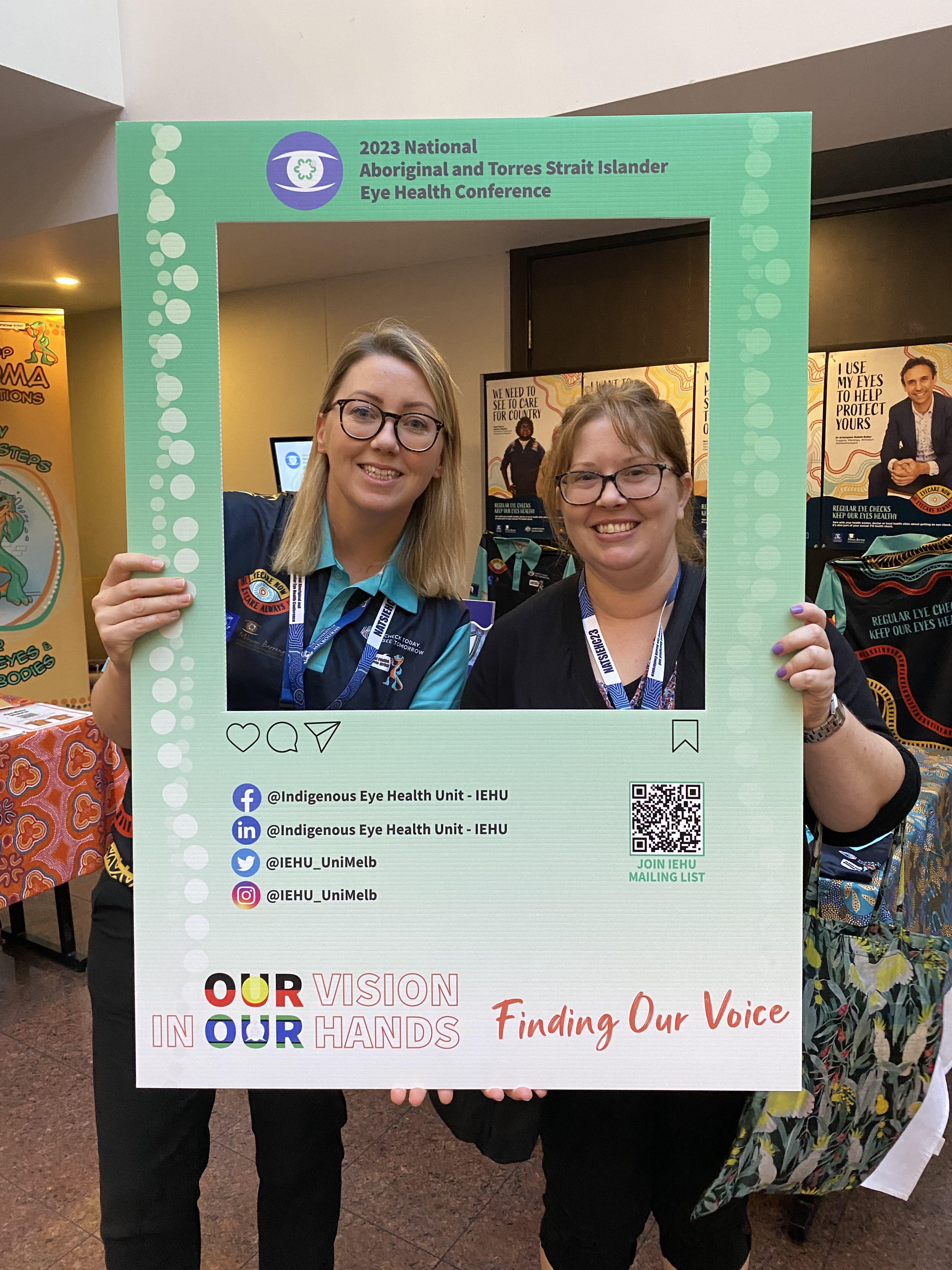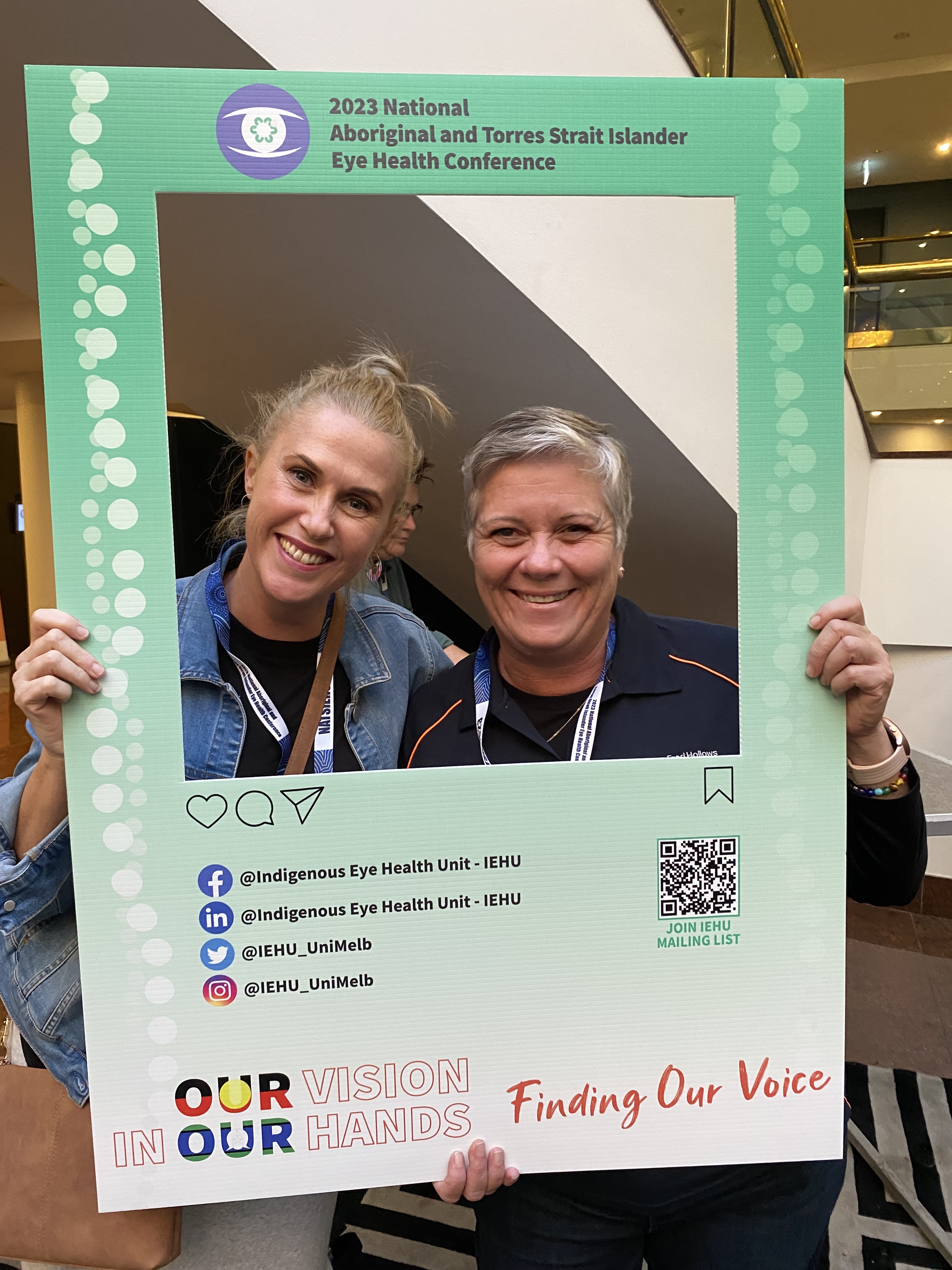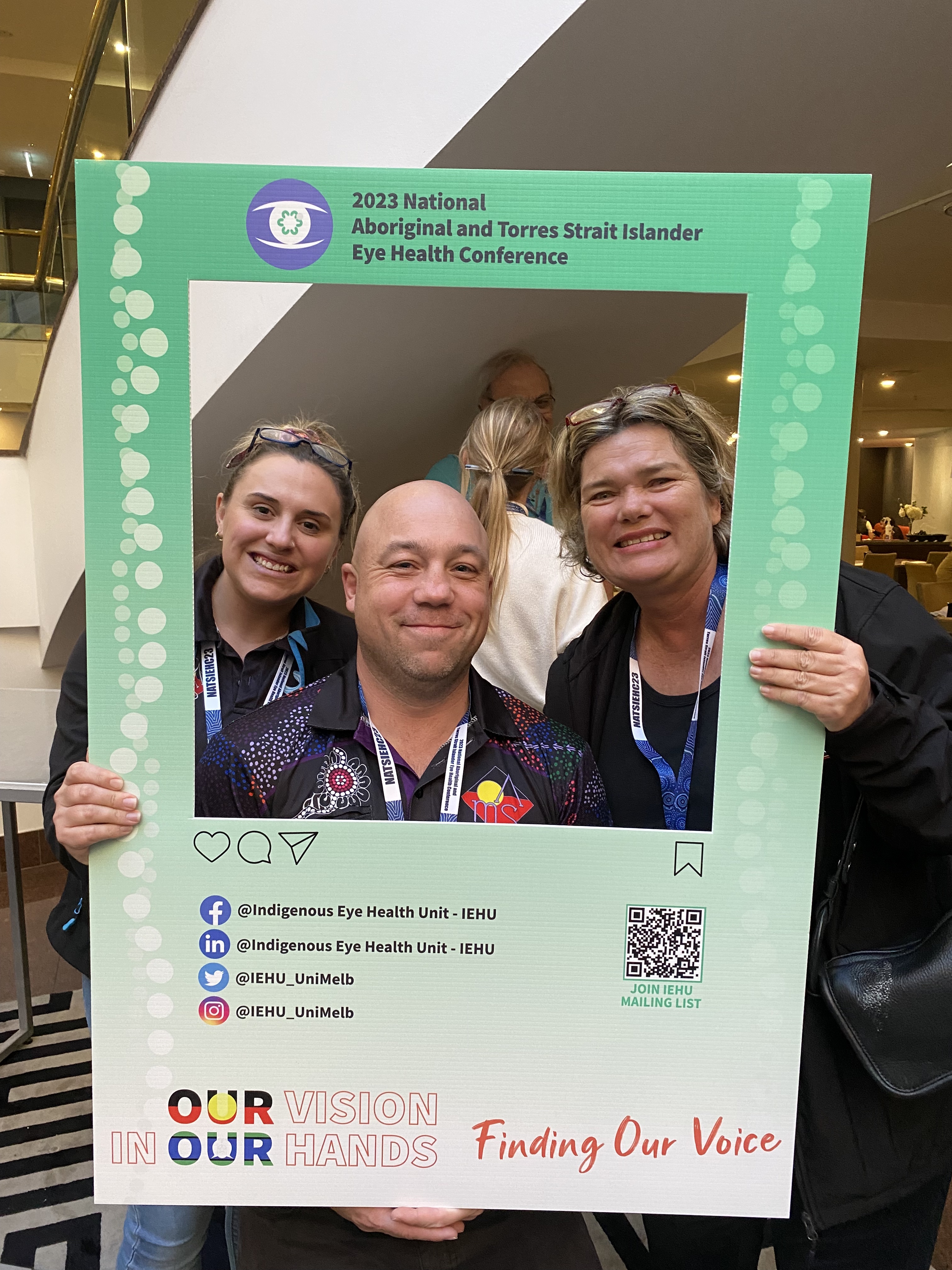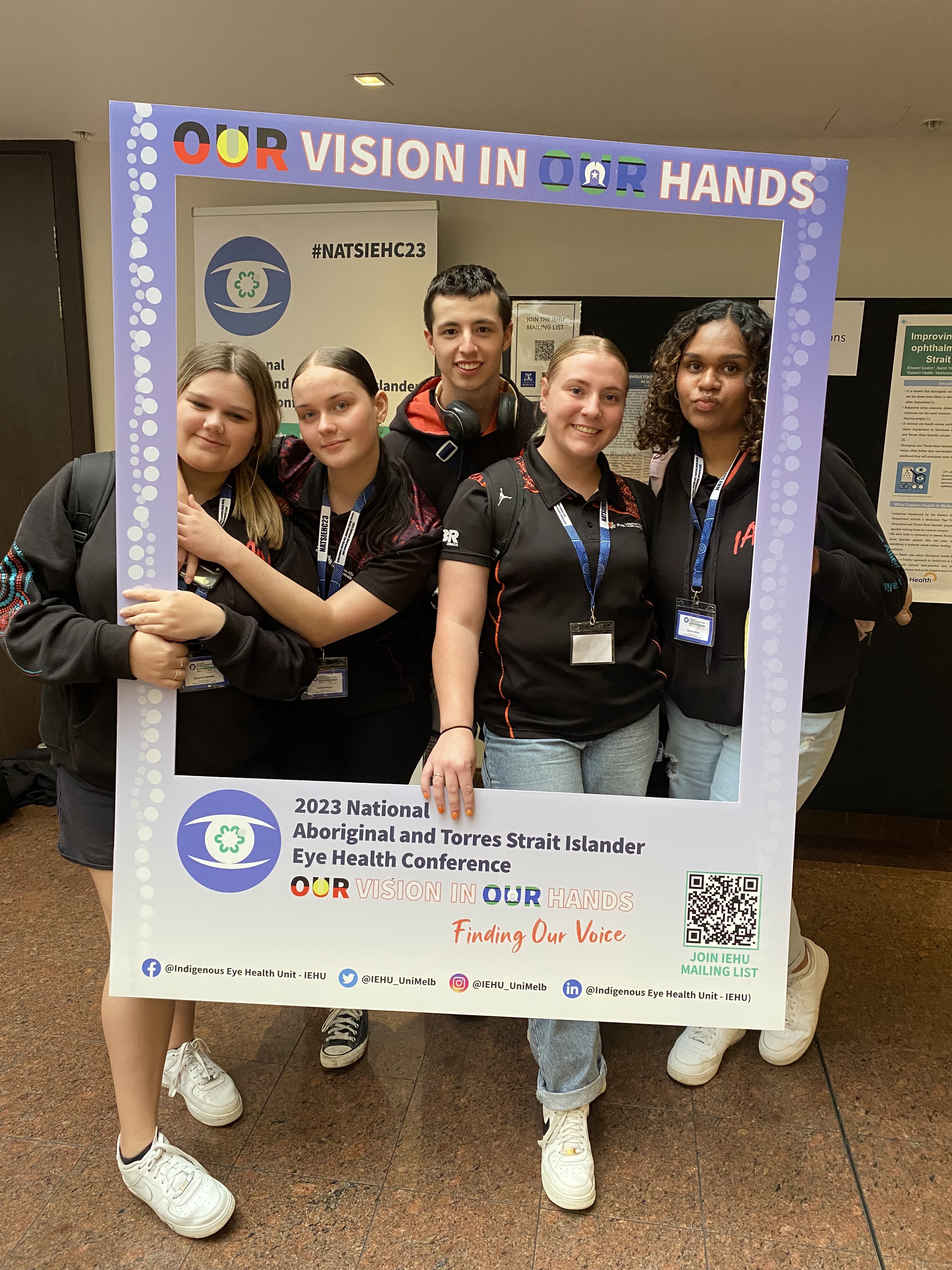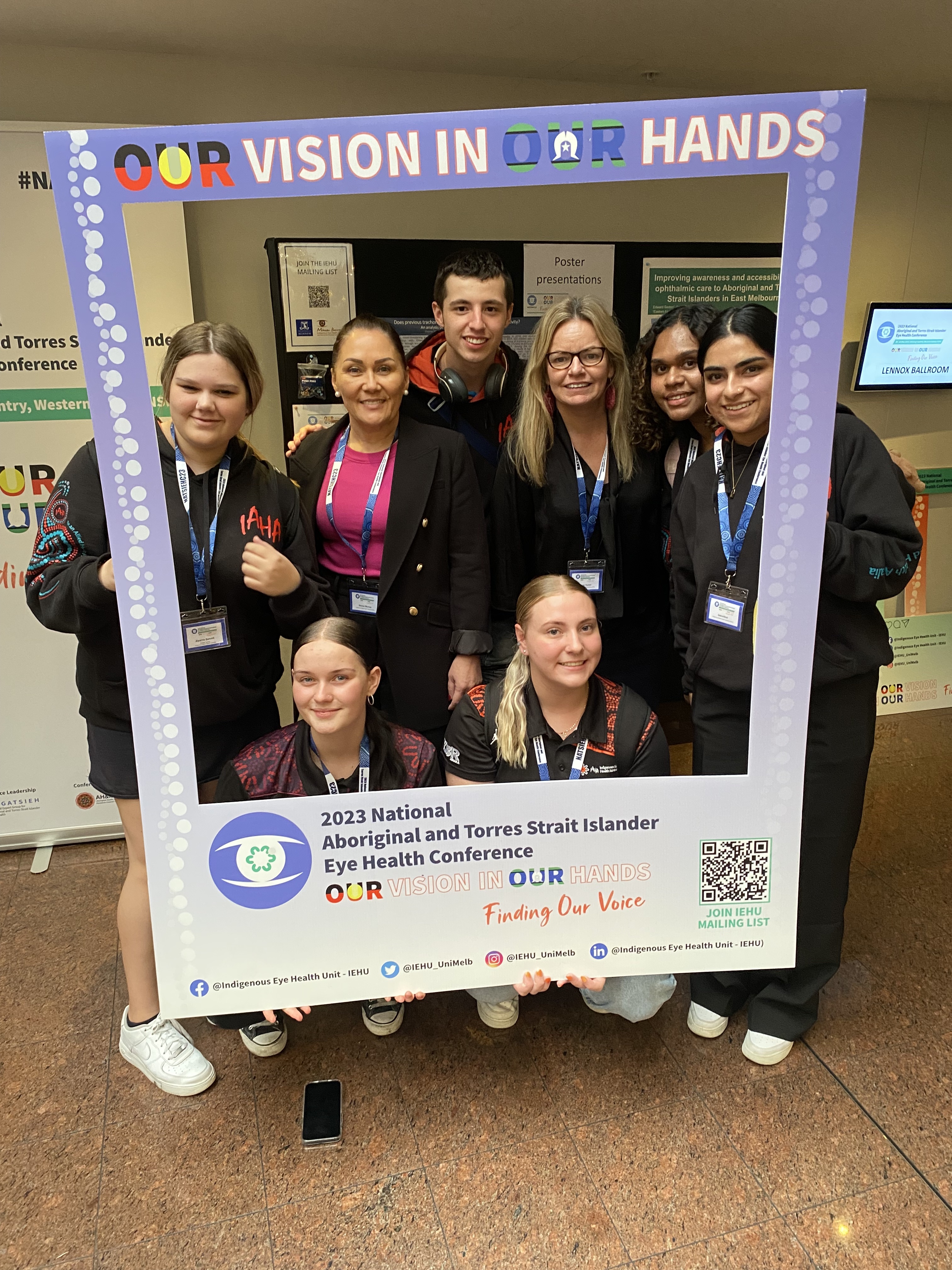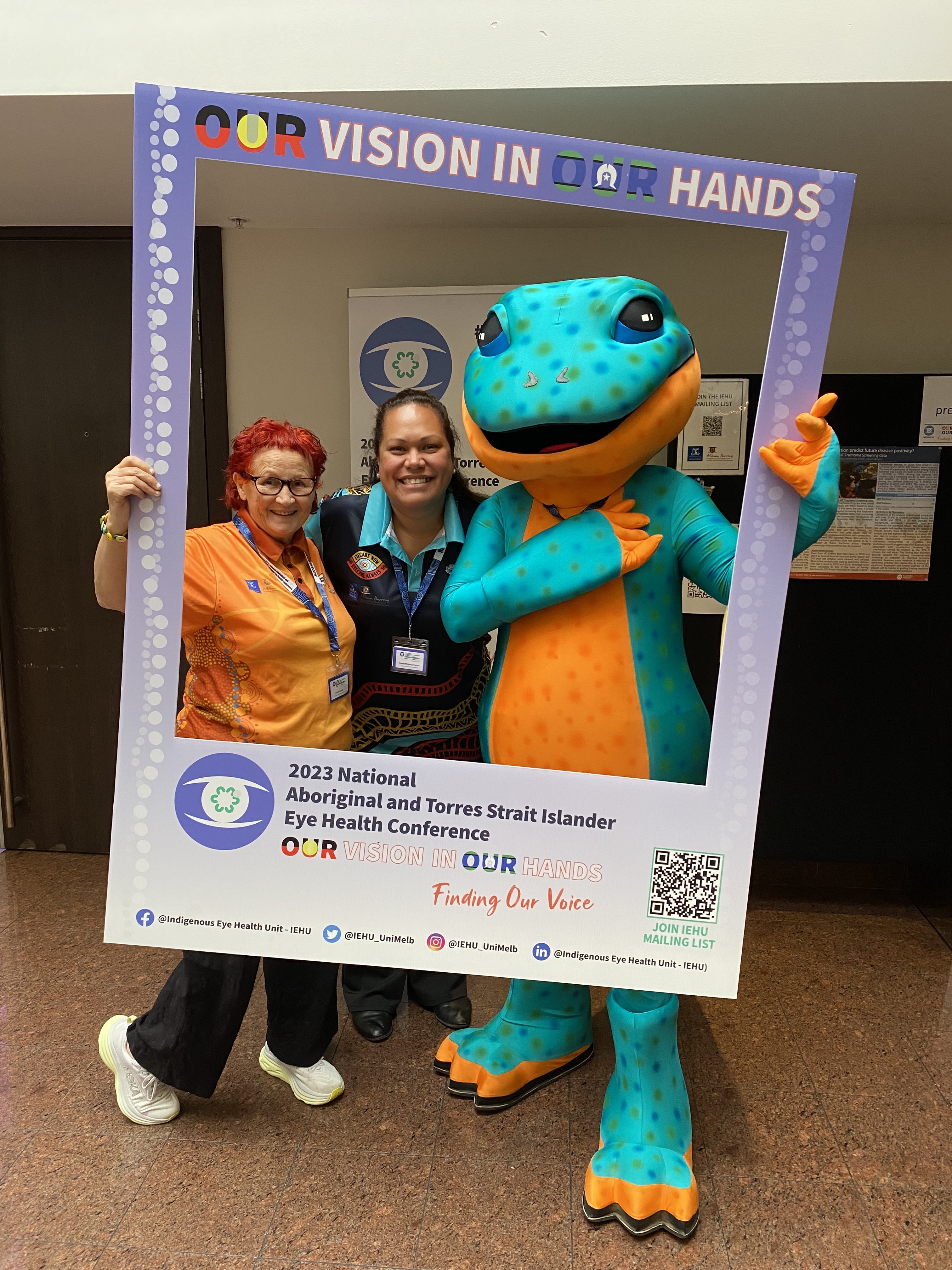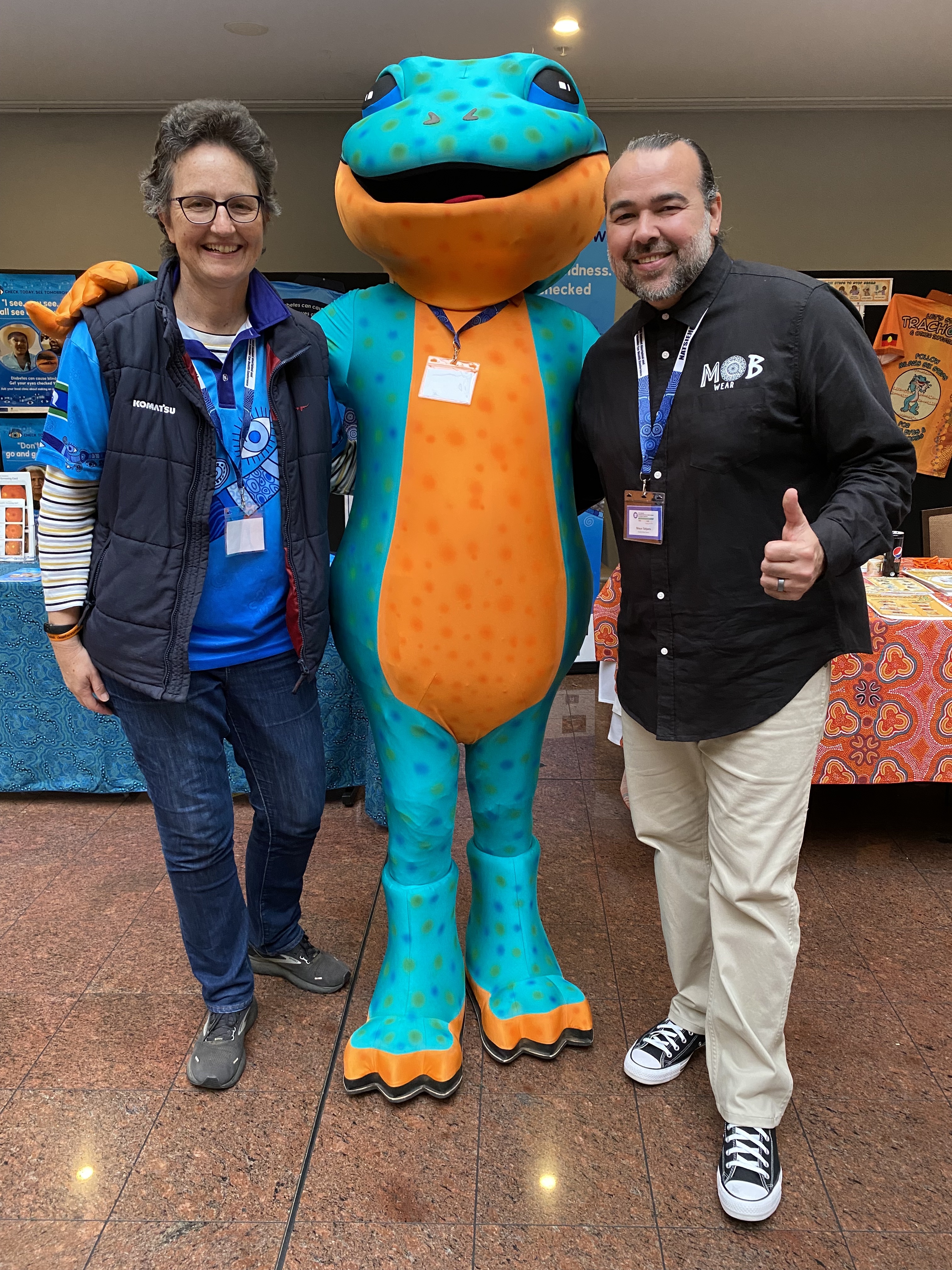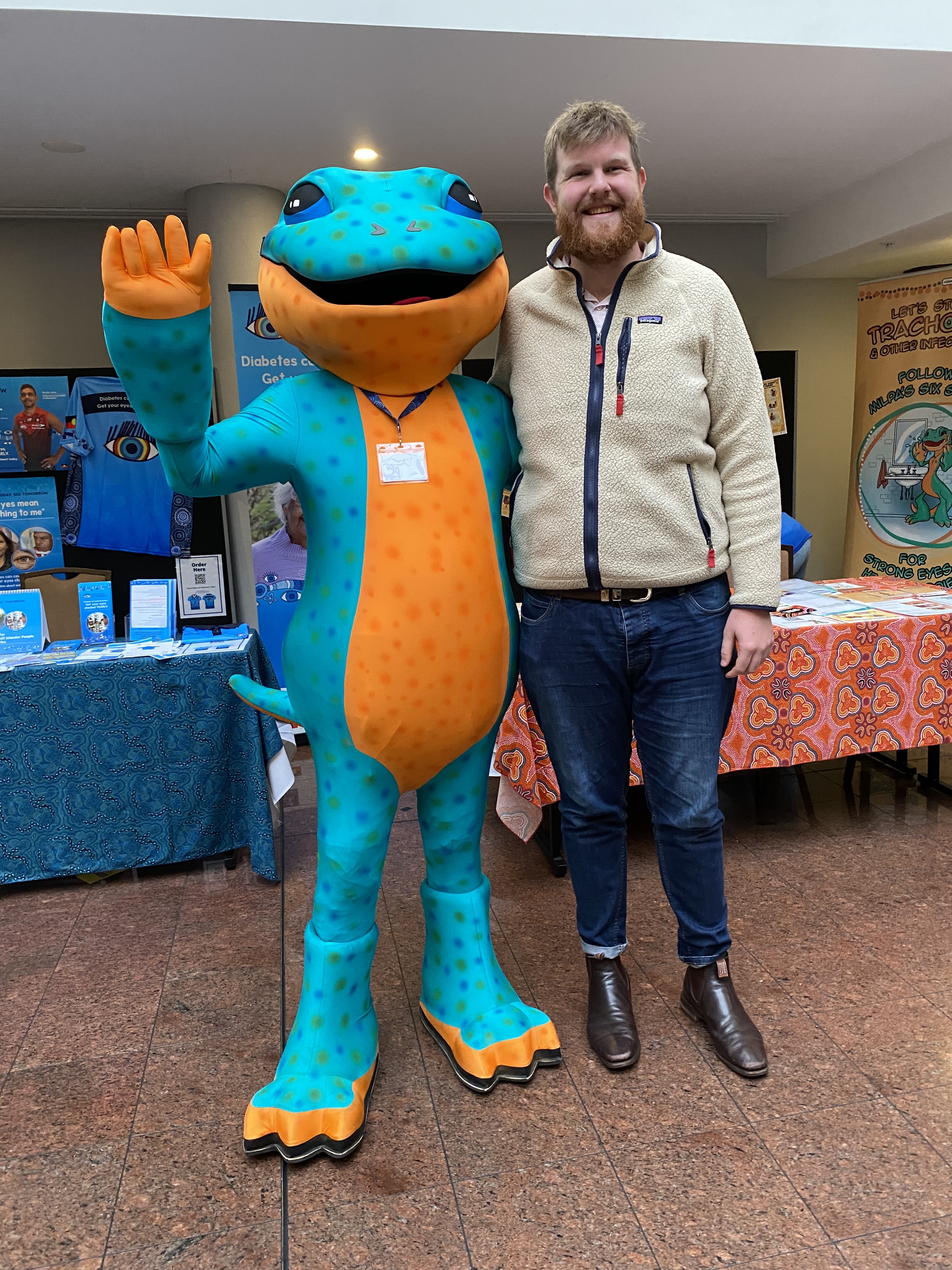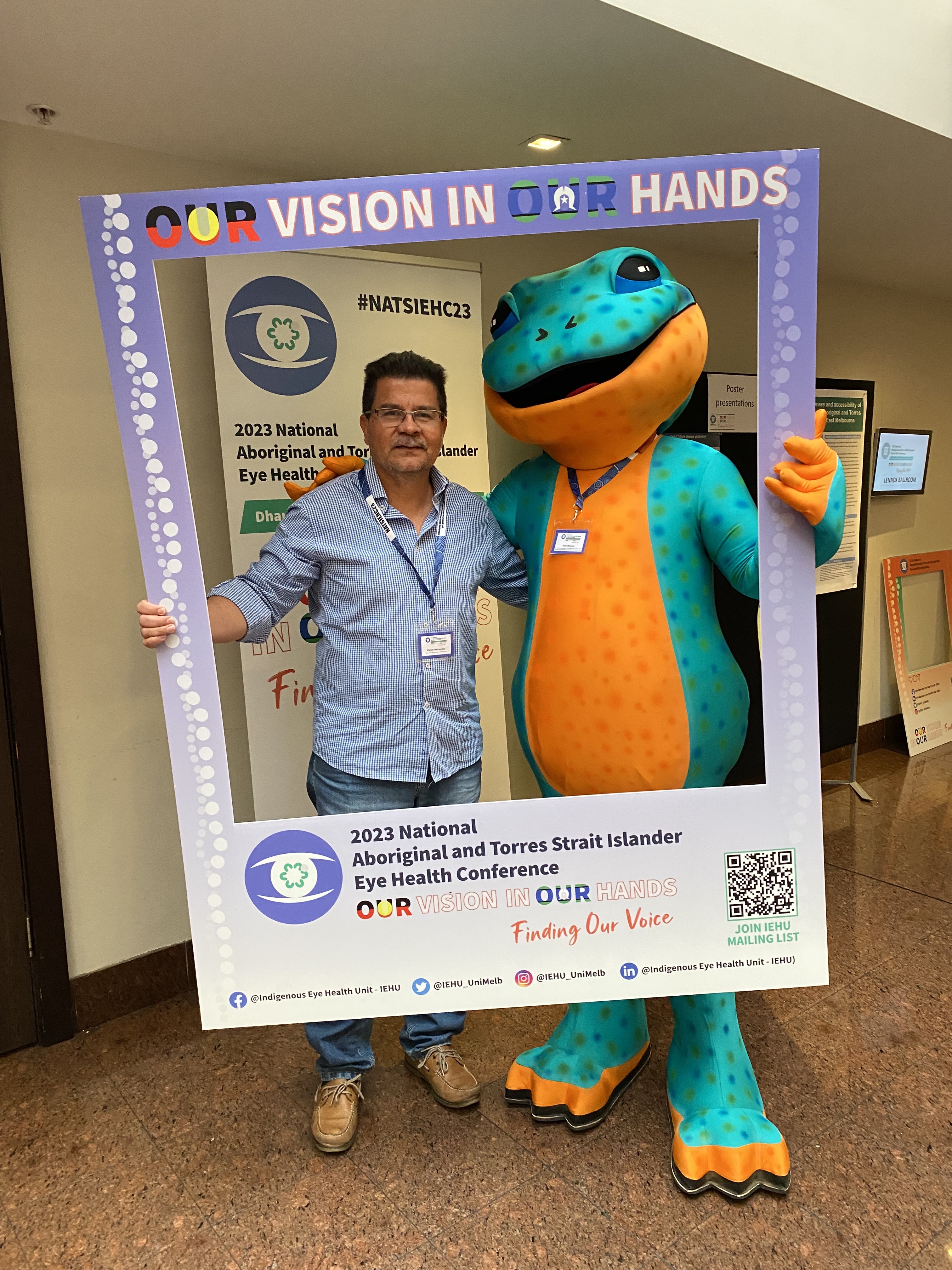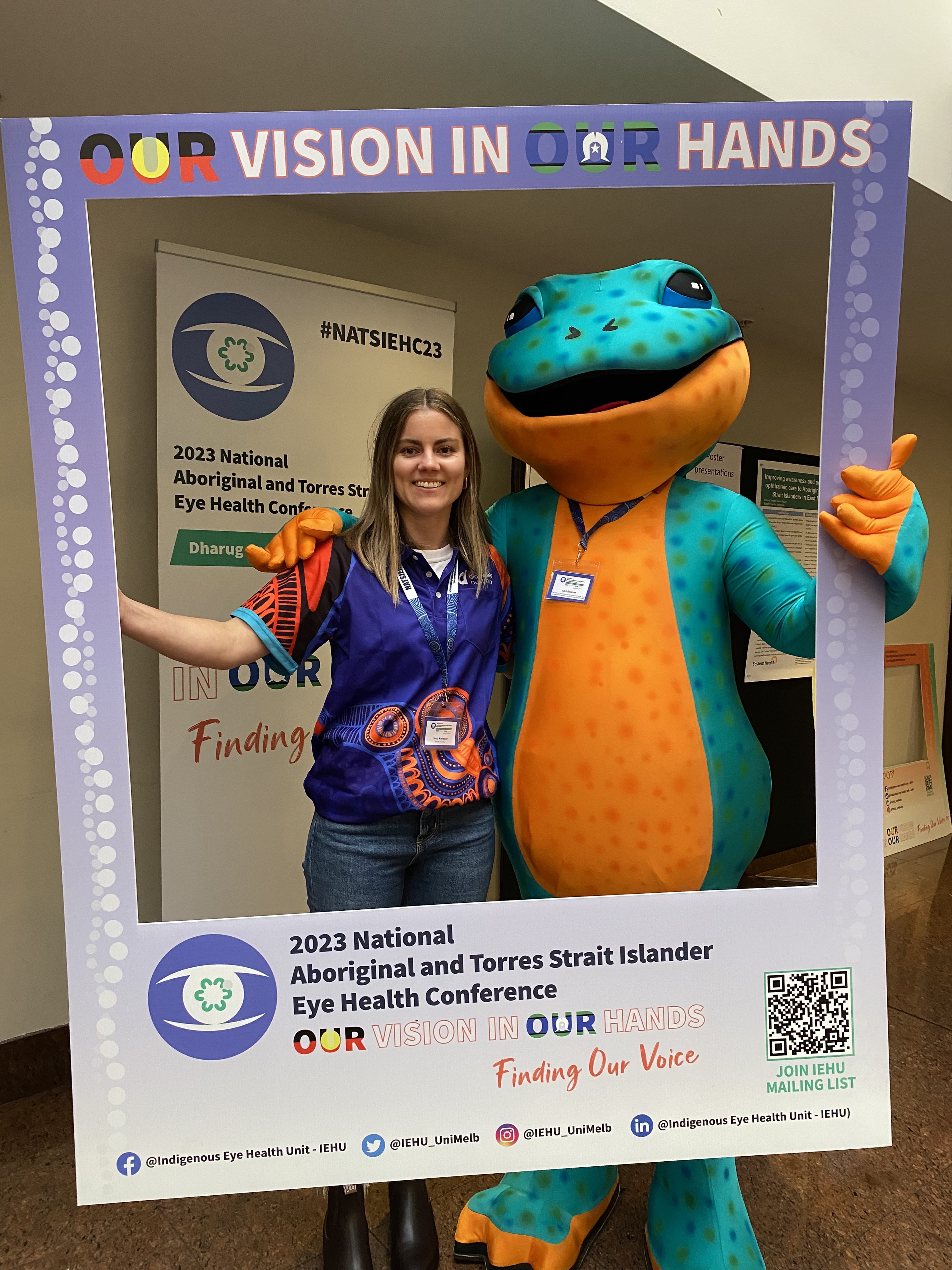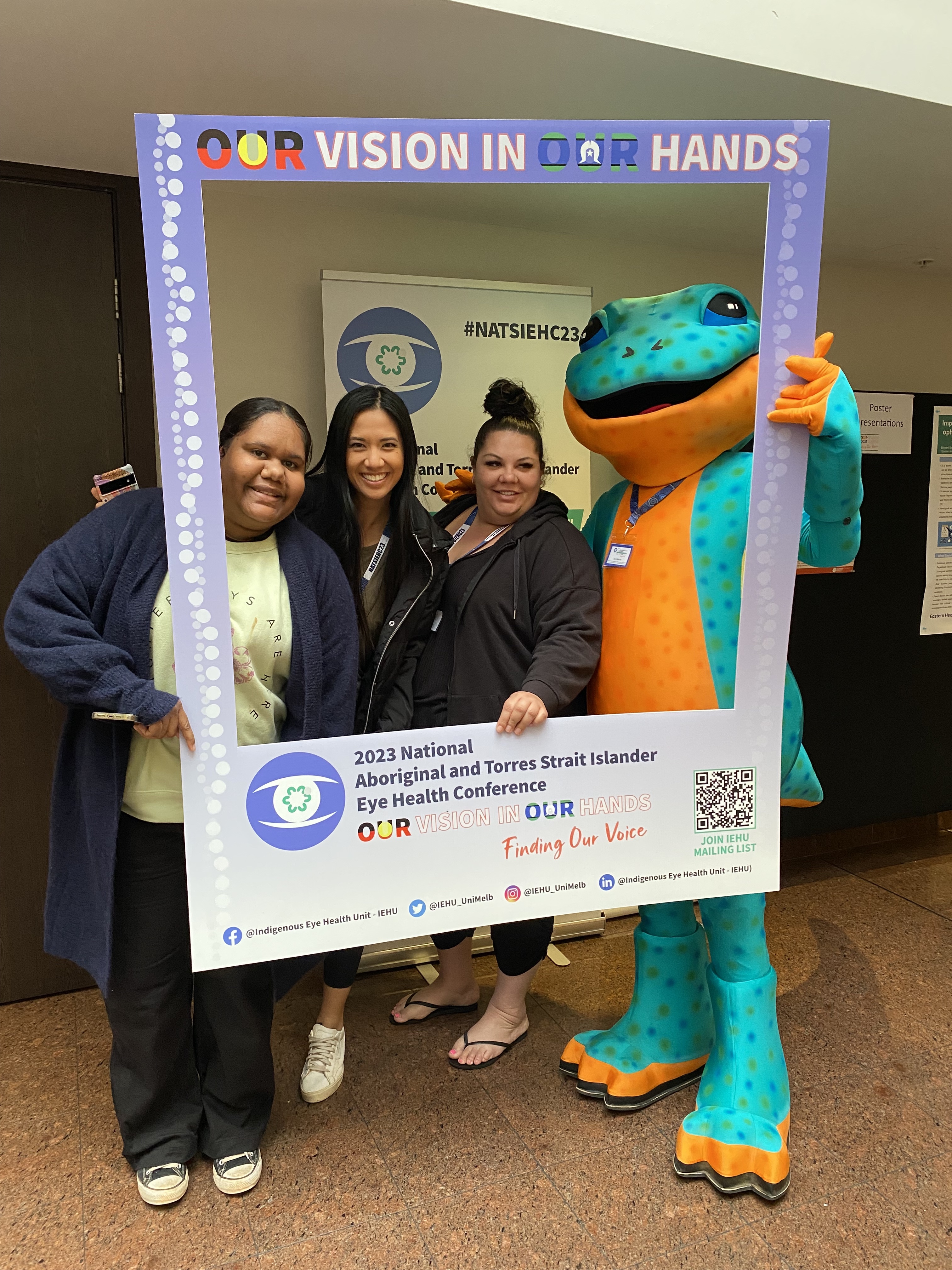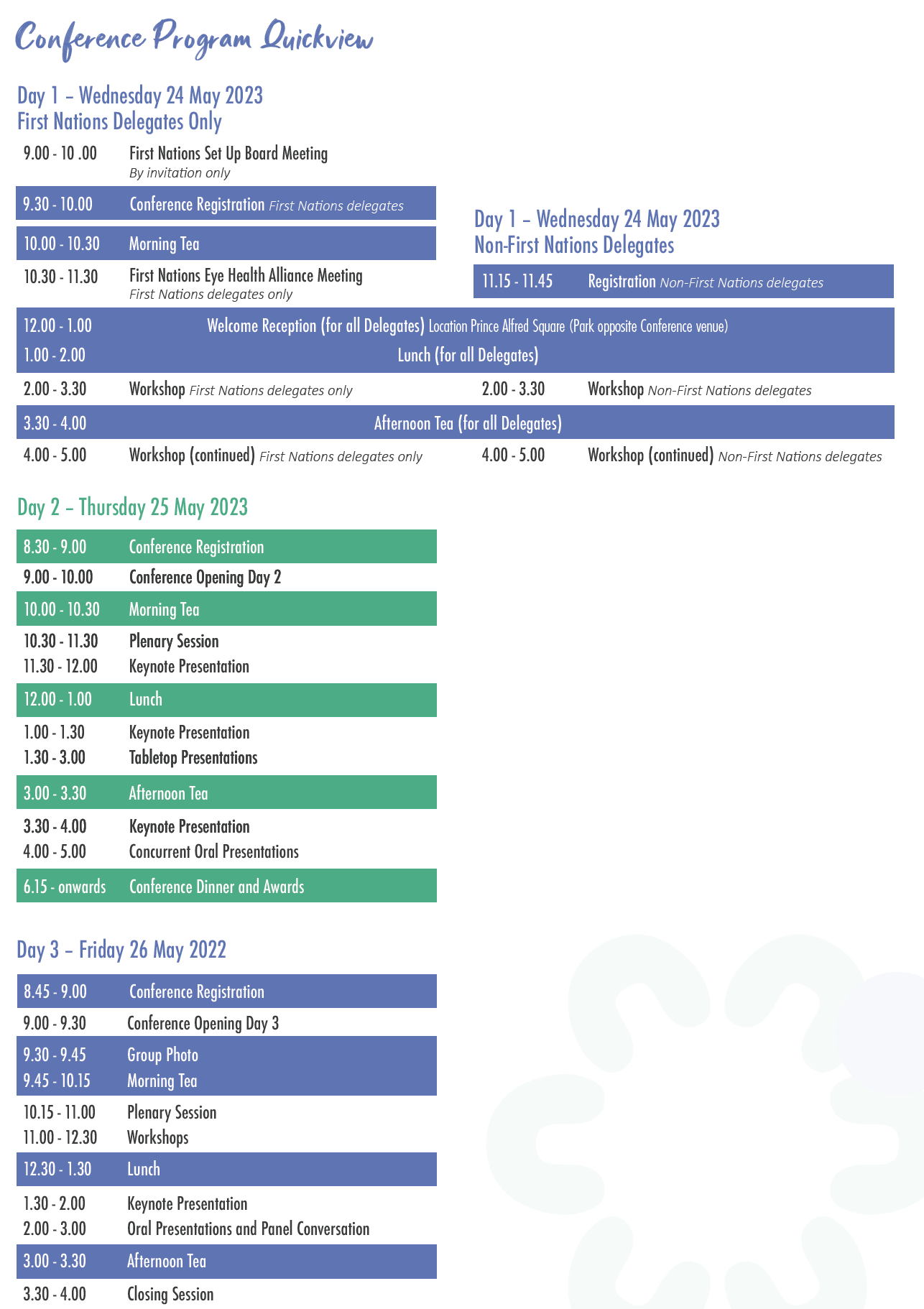2023 National Aboriginal and Torres Strait Islander Eye Health Conference
2023 National Aboriginal and Torres Strait Islander Eye Health Conference
Welcome
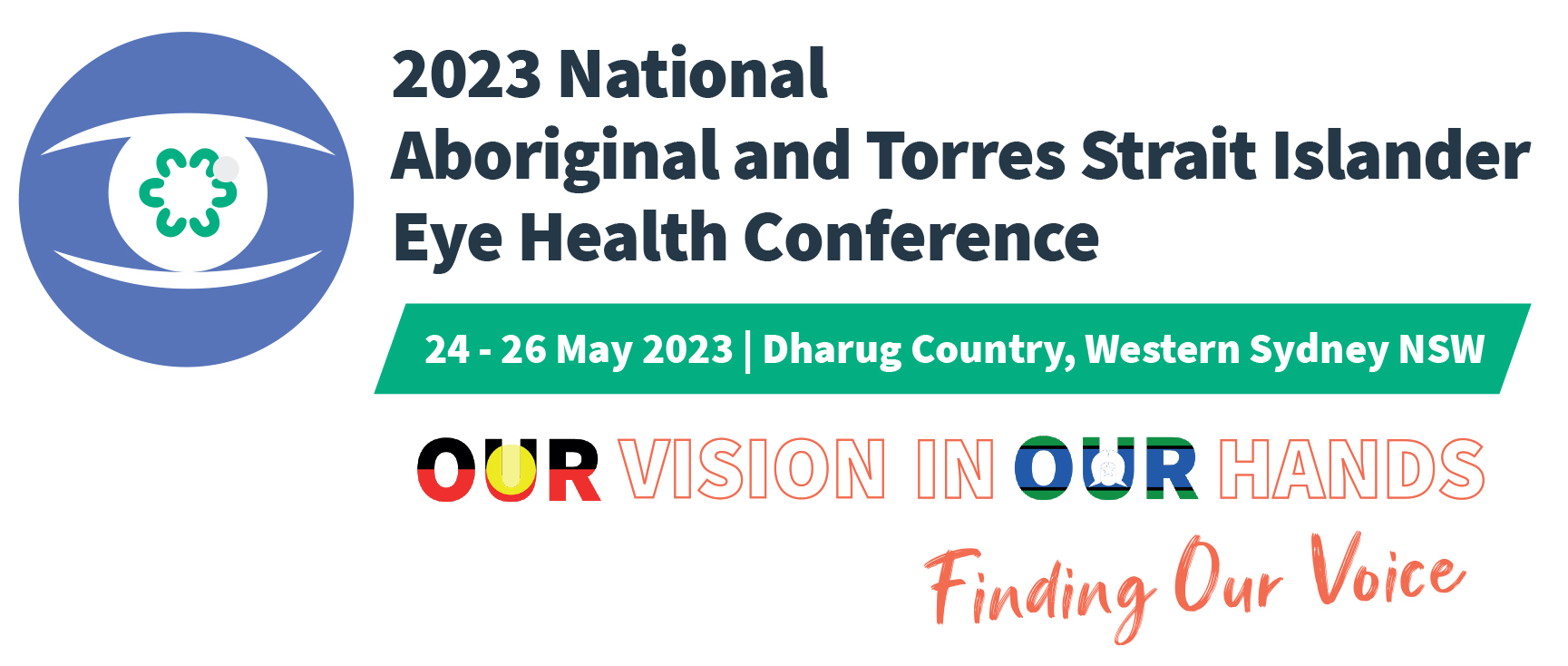
The 2023 National Aboriginal and Torres Strait Islander Eye Health Conference (NATSIEHC23) will be held on Dharug Country in Western Sydney from Wednesday 24 to Friday 26 May 2023.
The 2023 Conference is led by the National Experts Group for Aboriginal and Torres Strait Islander Eye Health (NEGATSIEH), which contributes to the Conference Leadership Group, supported by the Indigenous Eye Health Unit (IEHU) at The University of Melbourne. NEGATSIEH and IEHU are delighted to announce that the Aboriginal Health and Medical Research Council of NSW (AH&MRC) has accepted invitation to co-host NATSIEHC23.
The 2023 Conference will build on the wonderful 2022 Conference, where over 220 delegates gathered on Larrakia land in Darwin over 3 days in May. Since 2017, the national Conferences have developed into a key annual gathering of the Aboriginal and Torres Strait Islander eye health sector. The annual Conference provides a wonderful opportunity for a wide variety of voices to discuss and share success stories and challenges in eye health from across Australia.
National Conferences for the Aboriginal and Torres Strait Islander eye health sector have been held since 2017, making 2023 the seventh event. The annual Conference provides a wonderful opportunity for the sector to come together and a wide variety of voices are presented to support discussion and sharing of success stories and challenges in eye health from across Australia.
The Conference aims to advance the collective work of the Aboriginal and Torres Strait Islander eye health sector towards the shared goal of improving eye health access and outcomes of First Nations Australians. Delegates will include representatives from Aboriginal Community Controlled Health Organisations and other primary care service providers, eye care clinicians, policy makers, researchers, non-government organisations, hospitals, professional peak bodies and government departments from across the country.
Please join us in May 2023.
Please email Indigenous-EyeHealth@unimelb.edu.au with any questions.
NATSIEHC23 Sponsors
We would like to thank our sponsors for their vital contributions towards the running of this years Conference.
SILVER: The Fred Hollows Foundation

BRONZE: The Royal Australian and New Zealand College of Ophthalmologists (RANZCO)

Registration
Registration has now closed
We are pleased to announce that registrations are now open for the 2023 National Aboriginal and Torres Strait Islander Eye Health Conference (NATSIEHC23), in Parramatta, on Wednesday 24 to Friday 26 May 2023.
Dates and times
- Wednesday 24 May 2023; times to be advised; welcome function in evening
- Thursday 25 May 2023; times to be advised; conference dinner in evening
- Friday 26 May 2023; times to be advised
Who should attend the conference?
The Conference is designed to bring together and connect people involved in Aboriginal and Torres Strait Islander eye care from local communities, Aboriginal Community Controlled Health Organisations, health services, non-government organisations, professional bodies and government departments from across the country. We would like to invite everyone who is working on or interested in improving eye health and care for Aboriginal and Torres Strait Islander Australians.
Content
The Conference is planned to include keynote speakers, plenary sessions, tabletop presentations, workshops, campfire discussions, posters, sector awards, sector exhibition of resources, cultural experiences and social functions...and lots of time to chat and exchange.
Price
Registration closes 1 May, 2023
Community Conference Registration* | |
| Early Bird | $150 |
| Full registration (Open 1 Mar 2023) | $250 |
| One day registration | $150 |
| Conference dinner additional tickets | $75 |
| Youth dinner ticket (under 18 only) | $25 |
General Conference Registration | |
| Early Bird | $400 |
| Full registration (Open 1 Mar 2023) | $500 |
| One day registration | $300 |
| Conference dinner additional tickets | $150 |
| Youth dinner ticket (under 18 only) | $25 |
* Community registration is for Aboriginal and Torres Strait Islander delegates and delegates employed or on the board of an Aboriginal Community Controlled Organisation
Payment
Tickets are available to purchase through event management and ticketing website Eventbrite. Payment via credit card is preferred however if you require an invoice, this can be arranged. This invoice can be paid via bank transfer and BPAY. (Please allow 2 weeks once you register for your invoice to be created and sent to you).
Questions
Please email Indigenous-EyeHealth@unimelb.edu.au with any questions.
Keynote Speakers
We are excited to announce our 2023 Keynote Speakers
Jilpia Nappaljari Jones Memorial Oration
The Jilpia Nappaljari Jones Memorial Oration was first introduced in the 2022 Conference. It aims to celebrate the contributions of Aboriginal and Torres Strait Islander women to eye care. The Oration acknowledges the significant contribution Jilpia made to Aboriginal and Torres Strait Islander eye health and her inspiration for a whole generation of amazing women leaders in eye health. For more information about Jilpia Nappaljari Jones and the Memorial Oration, please see here.
The 2023 Jilpia Nappaljari Jones Memorial Oration will be presented at the 2023 National Aboriginal and Torres Strait Islander Eye Health Conference by Lauren Hutchinson.
Lauren Hutchinson - 2023 Jilpia Nappaljari Jones Memorial Oration
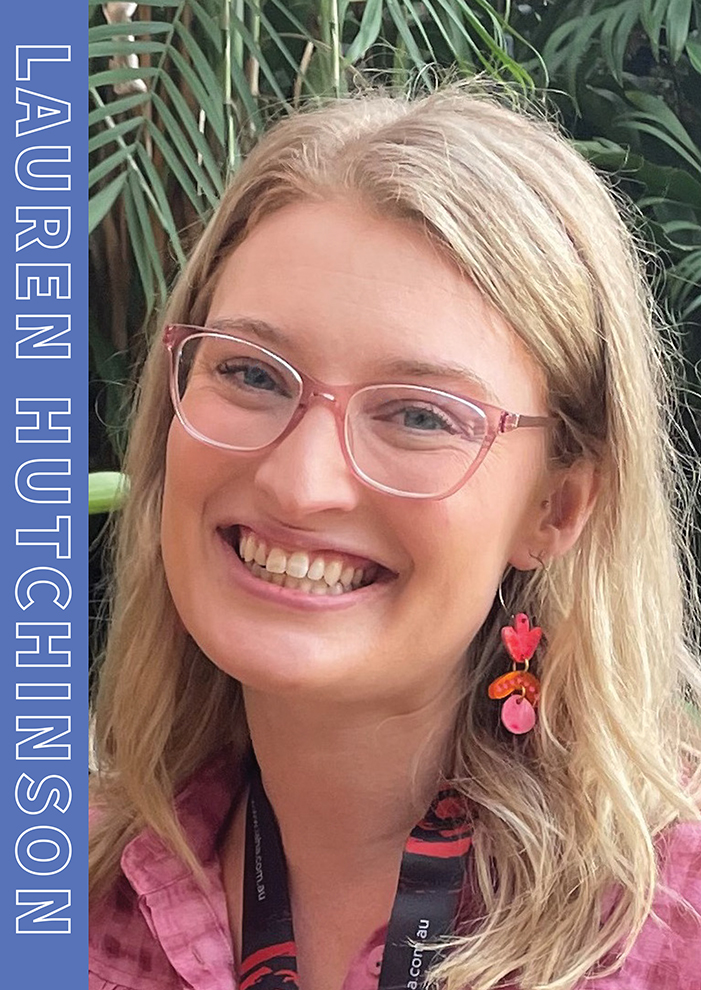
Lauren Hutchinson is a Murrawarri woman and optometrist. Lauren was born and raised on Wiradjuri country in the central west of NSW. She graduated from her Bachelor of Vision Science/Master of Optometry from QUT in 2017, following which, she returned to the central west, now residing back on the beautiful lands of the Wiradjuri people once again. Lauren has worked as an optometrist both in private practice and within the community controlled sector. She is a current director of both the Indigenous Allied Health Australia national and Northern Territory Workforce Development Boards.
Lauren's passions are in Aboriginal and Torres Strait Islander, rural and remote and paediatric health and is committed to advocating for improving outcomes for her people in these spaces.
In her spare time you can find Lauren spending time with her beautiful nieces and nephews, on a hockey field or fishing on the Galari (Lachlan River).
Donna Murray
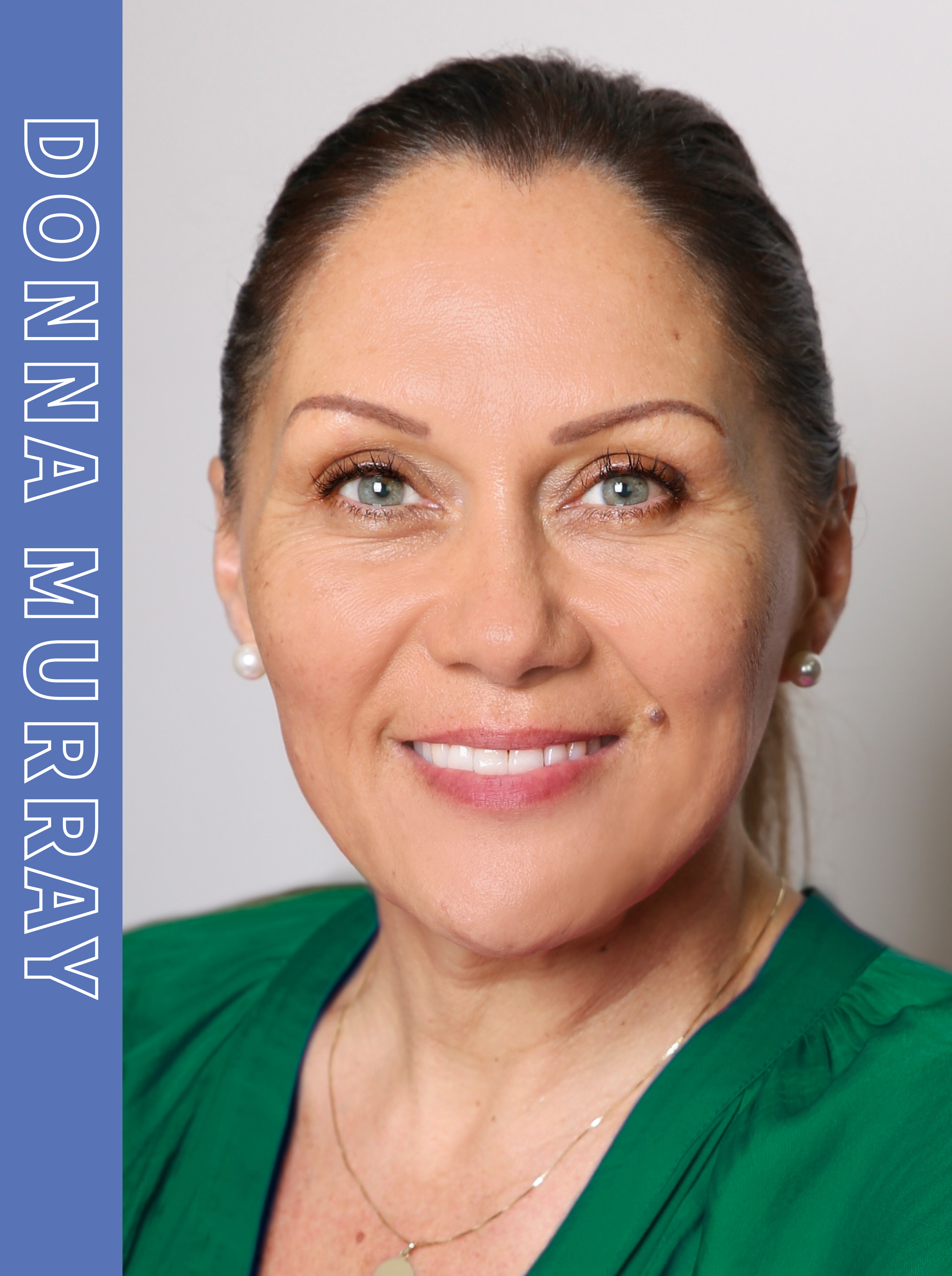
Donna Murray is a proud Wiradjuri and Wonnarua nation citizen. Donna is the Chief Executive Officer at Indigenous Allied Health Australia, holds an Adjunct Associate Professor role at the University of Technology Sydney and has formal qualifications in Community Development, Management, and Indigenous Governance. She is a 2021 Impact 25 Award winner with Pro Bono Australia, the Chair of PwC’s Indigenous Consulting, Chair of Thirrili Ltd and Board Director of Gayaa Dhuwi (Proud Spirit) Australia.
She is a committed Indigenous Community Development Practitioner working to support and assert the rights of Aboriginal and Torres Strait Islander people by recognising and reigniting cultural governance and leadership that embed Indigenous nation-building principles to shape a future of our own design now and for generations to come.
Renata Watene
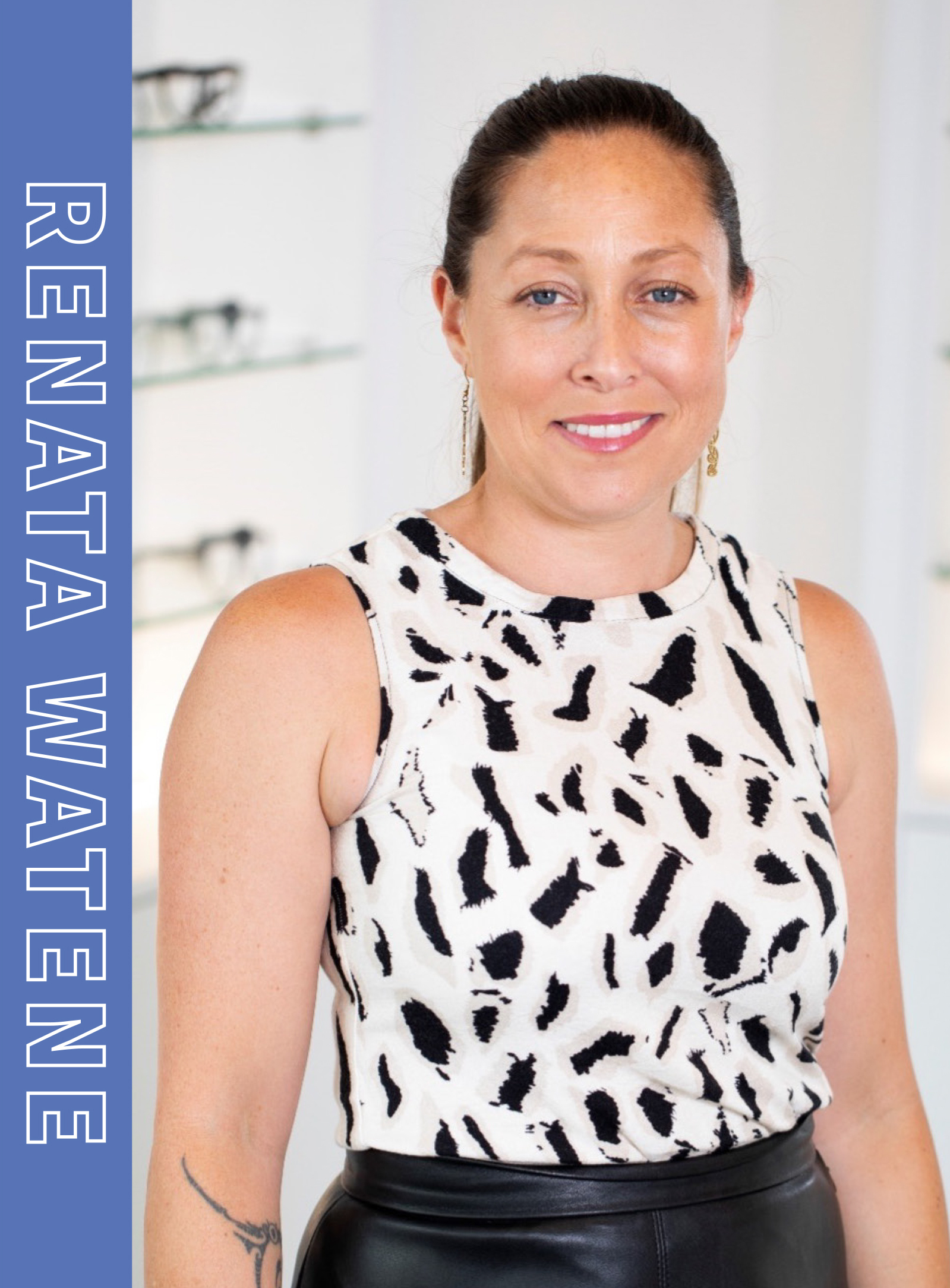
Renata Watene is one only of a few Māori Optometrists in Aotearoa. She has whakapapa (lineage) to Ngā Puhi and Tainui (tribes). As an immerging Indigenous Eye Health Leader, Renata holds several positions in Governance as a Healthcare Practitioner, Professional Teaching Fellow, Researcher, Business Owner and Health advocate.
With a twenty-three-year career in Optics, she has worked in private practice, corporate and franchise models in New Zealand and Australia. Currently, she is the Senior Optometrist and Director of her own two clinics - Occhiali Optometrist, the only 100% Indigenous-owned and operated clinics in the Auckland/Northern region amongst the highest population of Indigenous people in NZ.
Her Governance experience includes being the current Chair of the Strategic Indigenous Taskforce for Optometry Council of Australia and New Zealand, an elected member of the NZ Association of Optometry, a selected NIB Iwi Partnership Board member, and a past Ministerial Appointment to the Waitemata District Health Board.
She has a deep passion for improving equity for populations through Indigenous models of care that are accessible and focus on intergenerational gains.
She is a strong advocate for promoting Optometry and Health careers for Rangatahi Māori (Māori youth), supporting Te Whaka Piki Ake and Hikitia te Ora (a former student of the programme). In 2019 she was appointed a Kaiāwhina at the University of Auckland School of Vision Science. Some of her research projects include a multidisciplinary approach to Diabetes, the Aotearoa Vision Bus and the WHO Eyecare Situational Analysis Tool.
Renata is eager to share her whakaaro (thoughts) on Indigenous Health and how it can help us all and highlight prevention as a critical health strategy.
Karl Briscoe
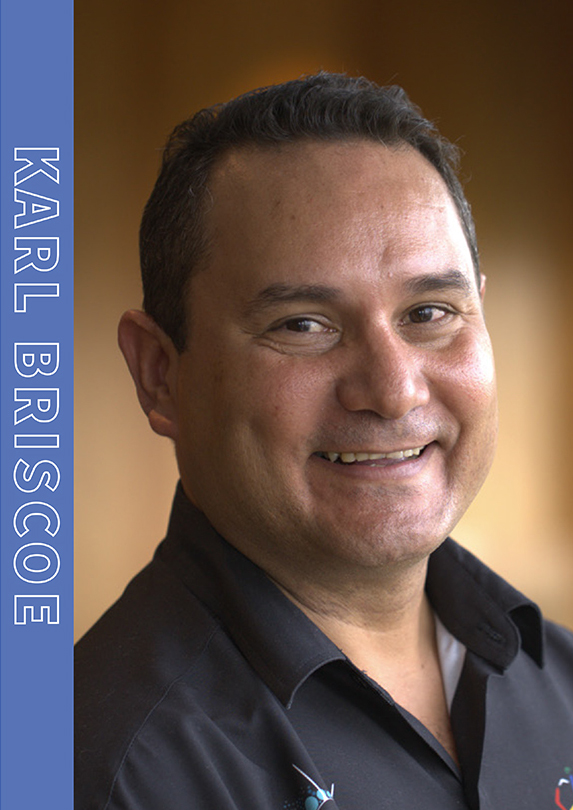
‘Karl Briscoe is a proud Kuku Yalanji man from Mossman – Daintree area of Far North Queensland.
Karl is the CEO of the National Association of Aboriginal and Torres Strait Islander Health Workers and Practitioners (NAATSIHWP). Karl has worked for over 20 years in the health sector at various levels of government and non-government including local, state and national levels which has enabled him to form a vast strategic network across Australia.
NAATSIHWP is the peak body for Aboriginal and/or Torres Strait Islander Health Workers and Aboriginal and/or Torres Strait Islander Health Practitioners in Australia’.
Awards
The 2023 National Aboriginal and Torres Strait Islander Eye Health Awards:
The 2023 National Aboriginal and Torres Strait Islander Eye Health Awards were presented during the National Aboriginal and Torres Strait Islander Eye Health Conference 2023 on Dharug country, 24-26 May 2023.
Congratulations to the 2023 National Aboriginal and Torres Strait Islander Eye Health Award recipients:
Image: 2023 National Aboriginal and Torres Strait Islander Eye Health Award winners: Ben Hamlyn, Shannon Davies, Walgett AMS (accepted by Jenny Hunt) and Janet Richardson (accepted by Kerry Woods)
Exceptional Contribution to Aboriginal and Torres Strait Islander Eye Health Award by Aboriginal Community-Controlled Health Organisations (ACCHO): Walgett Aboriginal Medical Service
From the nomination statement: The Walgett Aboriginal Medical Service (WAMS) was one of the first eye health locations within an Aboriginal Community Controlled Health Service in NSW to provide bulk billed optometry services provided to their community members, starting in 1999 through NSW Aboriginal Vision program, co-designed with the Aboriginal Health and Medical Research Council of NSW (AH&MRC) and the Brien Holden Foundation (then known as ICEE). The fruit of those early seeds of collaboration continue to flourish today.
The nomination highlighted the dedication and commitment of WAMS management to eye health, as they have continued to fund a dedicated Eye Health Coordinator position since the very beginning of this program until today.
The WAMS Eye Health Coordinator supports clinics in Walgett and outreach services at Lightning Ridge, Goodooga, Collarenebri, Narrabri, Wee Waa and Pilliga.
Up until 2015 the WAMS Eye Health Coordinator serviced both the Walgett region and Hunter New England regions, supporting over 30 outreach clinics. WAMS worked with the support of optometry provider the Brien Holden Foundation to hand some of the Western NSW and Hunter New England clinics over to the established Aboriginal Community Controlled Health Services in those communities.
WAMS embraced eye health so much that they applied for infrastructure grants to establish a well-equipped dedicated eye health room. Local outreach patients are referred into WAMS when OCT imaging in required which eliminates travel for patients so eye health conditions can be managed locally.
Image: Nick Wilson with Jenny Hunt, who accepted the award for Walgett Aboriginal Medical Service (WAMS)
Outstanding Leadership in Aboriginal and Torres Strait Islander Eye Health Award: Janet Richardson
From the nomination statement: "Janet has been involved in eye health for many years. She is currently based in Broome working as an Aboriginal Health Worker. As a respected elder of Baard and Yawuru Ooranyg/Ngala Jandu (salt water woman), she has also been a community ambassador for the new Lions Outback Vision Kimberley Hub.
Janet’s journey with health care began when she was 15. She trained as a nurse and worked at the Broome Regional Aboriginal Medical Service (BRAMS) as technical assistant at Pathwest. In eye health, she has worked at the Fred Hollows Foundation and was based in the East Arnhem Region for 15 years as the Eye Health Coordinator and then worked for a period of time in WA Country Health Service (WACHS) as the Trachoma program coordinator. She is now back home in Broome and playing an important role in connecting her community to the eye care pathway. She says: “A healer has a special place in the community, is a promoter of health who will always regard persons who have taught them their craft, from this I have learnt and carried throughout my whole life the responsibility and honesty to maintain confidentiality entrusted to me for my job performance.”
Image: Lauren Hutchinson with Kerry Woods who accepted the award on behalf of Janet Richardson
Emerging Leadership in Aboriginal and Torres Strait Islander Eye Health Award: Shannon Davies
From the nomination statement: "Shannon is Australia’s first Indigenous woman to graduate in optometry. She grew up in Mareeba, a small town with a population of around 7,000 in Far North Queensland. She comes from the Wiradjuri People of Dubbo in New South Wales.
After completing her optometry degree at the University of Melbourne in 2004, she has become a pioneer for her people in the field of optometry, working in rural parts of Australia conducting school screenings and providing spectacles and eye care for Indigenous patients in remote clinics. Shannon owns a private optometry practice in Ayr Queensland. Shannon has been a member of the Optometry Australia Aboriginal Advisory Group. She is currently Deputy Chair of the Optometry Council of Australia and New Zealand Indigenous Strategy Taskforce and a member of the OCANZ Board.
Shannon’s pioneering work exemplifies this year’s theme of Our Vision in Our Hands: Finding our Voice and she is a leader in Aboriginal and Torres Strait Islander eye health.
Image: Nick WIlson with Shannon Davies
Deadly Allyship in Aboriginal and Torres Strait Islander Eye Health Award: Ben Hamlyn
From the nomination statements: Ben Hamlyn is an Adelaide based optometrist who has spent the last 10+ years working in remote communities to improve accessibility and quality of eyecare for first nations people living in the APY lands, Coober Pedy and Port Augusta. It is worth noting that Ben received no less than 4 separate nominations, a testament to the impact Ben continues to have on his colleagues.
Ben has made significant contributions to the health and well-being of the Anangu of the Pitajtjantjara Yankuntjatjara Lands South Australia, and throughout the regions where he works. Ben has conducted hundreds of eye checks, providing prescription glasses to people who would have otherwise struggled with daily living activities. Ben has also worked closely with the Aboriginal Community Controlled Health Services and their eye nurses and coordinators in developing community-based eye health programs that focus on prevention and early intervention, which are critical for reducing the incidence of eye disease among Indigenous communities. Ben has expanded Community Eyecare (the name under which he practices) from just himself a couple of years ago, to a team of 5 optometrists and growing, allowing for a significant increase in services given across the state. Ben not only still visits and sees these patients, but also coordinates the team and organises each clinic, corresponding with communities, funding bodies, and individuals to provide a seamless structure and an effective delivery of excellent service.
Ben’s commitment to Indigenous eye health is evident in all aspects of his work, from his clinical practice to his advocacy for the provision of funded prescription glasses and policy work in his role at Optometry Australia.
Image: Lauren Hutchinson with Ben Hamlyn
The 2023 National Aboriginal and Torres Strait Islander Eye Health Awards
Award Nominations
The 2023 National Aboriginal and Torres Strait Islander Eye Health Awards recognise achievements and contributions in Aboriginal and Torres Strait Islander eye health. These sector awards, formerly known as the Leaky Pipe Awards, have been handed out to champions and unsung heroes in Aboriginal and Torres Strait Islander eye care annually as part of the sector’s national conferences since 2018.
The awards are aligned with the Conference theme – Our Vision in Our Hands: Finding our Voice – set by the National Experts Group for Aboriginal and Torres Strait Islander Eye Health (NEGATSIEH), which contributes to the Conference Leadership Group.
This broad theme works to highlight and promote the importance of Aboriginal and Torres Strait Islander perspectives and leadership in the eye health sector locally and nationally. The theme also promotes the need for greater First Nations leadership through community-controlled services and evolving national governance mechanisms, including the call to enshrine an Indigenous voice into the Australian constitution.
We are pleased to open nominations for the 2023 awards, in the following categories:
- Contribution to Aboriginal and Torres Strait Islander eye health by Aboriginal Community-Controlled Health Organisations (ACCHO)
- Contribution to Aboriginal and Torres Strait Islander eye health (Individual)
- Aboriginal and Torres Strait Islander leadership in eye health
- Allyship in contribution to Aboriginal and Torres Strait Islander eye health
We are particularly interested in identifying and acknowledging the many ‘unsung heroes’ in Aboriginal and Torres Strait Islander eye health.
The 2023 National Aboriginal and Torres Strait Islander Eye Health Awards will be presented during the National Aboriginal and Torres Strait Islander Eye Health Conference 2023 on Dharug country, 24-26 May 2023.
See 2022 Award Winners Here:
-
Aboriginal Health Council of South Australia for the leadership of Michael Larkin and Chris Rektsinis in eye health in South Australia, with special allyship mention to Nicholas Schubert of Indigenous Eye Health Unit.
In 2021, AHCSA took on the responsibility of coordinating the quarterly run state Indigenous eye health committee – the SA Aboriginal Eye Health Working Group (SAAEHWG). The committee has been professionally run since then with working group sub committee planning sessions and with reference to state level data and the Roadmap to Close the Gap for Vision to guide the priorities and work that has occurred to date. The leadership provided by Michael Larkin in Chairing the committee and Chris Rektsinis in coordinating the group has been committed to service reform from the start. The underlying principle of this being an action based group that identifies high level gaps in policy, workforce, funding and resourcing has led the work of this group and is already creating real change to improve access to care for the Aboriginal and Torres Strait Islander community in South Australia. As we mentioned, there is also a special allyship mention to Nicholas Schubert of Indigenous Eye Health Unit. This is also to acknowledge that the award winners and Nick Schubert have actually nominated one another for an award. From the nomination statement, “Nick worked closely in partnership with AHCSA to establish the much needed South Australia Aboriginal Eye Health Working Group (SAAEHWG), whilst concurrently identifying and/or establishing several SA regional eye health collaborations. One advancement from these engagements has been the set-up of several fast-track cataract priority pathways for Aboriginal people in urban and rural areas, and reinforcing the relationships between primary, secondary and tertiary services.
-
Will Chin
Will has been nominated “for his efforts to help improve access to eye care for Aboriginal and Torres Strait Islander people in my community. His efforts go over and above personally delivering eye care and include the donation of equipment, training and upskilling AHWs/AHPs, providing mentoring, and advocating strongly for the redistribution of eye health funding to Aboriginal organisations”. Will’s generosity and commitment to improving Aboriginal and Torres Strait Islander eye health also extends to building capacity and capability in the ACCHOs he visits by donating/ upgrading equipment, expanding services and responding to the aspirations of the ACCHOs and the communities they represent. He expects nothing in return and is content with seeing individuals and Aboriginal Organisations succeed in delivering eye care to their communities. And as a true ally, Will would also prefer to remain in the background and instead often assigns credit appropriately, and even uses his position/power to amplify our voice to fundholders. These are the actions of a true ally and an unsung hero.
-
Mitchell Anjou
Mitchell lives and breathes the values of the 2022 Conference theme, ‘Our Vision in Our Hands’, genuinely seeking allyship, and to promote and advance First Nations leadership and ownership over the eye health sectors’ work and vision throughout his many spheres of influence. These span his work progressing regional implementation of the Roadmap to Close the Gap for Vision (2012) at the University of Melbourne, his commitments across the optometry sector through Optometry Australia, Optometry Victoria/South Australia and the Optometry Council of Australia and New Zealand (OCANZ), and his engagement with the broader eye health and vision care sector via Vision 2020 Australia. Across his contributions to the optometry sector in particular, notably as Chair of the Optometry Australia Aboriginal and Torres Strait Islander eye health Advisory Group, and co-Chair of the OCANZ Indigenous Strategy Taskforce, Mitchell has consistently sought to engage and empower First Nations people, through mentorship; the active creation of opportunities which seek to build capacity; and holding space for transfer of power and leadership roles as suitable. Further his personal commitment to ensuring that the optometry profession in particular takes strong steps towards reconciliation in all spheres has established and continues to strengthen progress among leading organisations in the sector.
-
Lauren Hutchinson
Lauren is a valued graduate member of IAHA who is extremely generous with her time and knowledge, supporting positive health and wellbeing outcomes for Aboriginal and Torres Strait Islander people and rural Australians. Lauren has contributed significantly to the work of IAHA, including through her representation on committees, such as the Vision 2020/NACCHO Roundtable on Eye Health and Vision Care, and through her input on national health policy consultations. Lauren’s expertise in Aboriginal and Torres Strait Islander eye health and her personal and professional experience working in a rural setting, allows IAHA to develop and inform policy to achieve true equity in health care. As a student Lauren sat on the IAHA Student Representative committee playing an important role in building and promoting allied health workforce development and contributing to IAHA’s vision that all Aboriginal and Torres Strait Islander people, including future generations, are healthy, strong, thriving and self-determined. Lauren is passionate about contributing to her local community. She believes in quality health care in rural areas. This is evidenced by her returning to her home town after uni and started work as an optometrist in Forbes. She has started a school screening program in her local area after noticing that the local Aboriginal kids weren't accessing the eye testing service. Lauren goes above and beyond to work with and for her community, including as a role model to future Aboriginal and Torres Strait Islander optometrists.
-
Orange Aboriginal Medical Service
Orange Aboriginal Medical Service have been working, with support from Rural Doctors Network and AH&MRC, on systems to better integrate eye care in clinical practice. Their services include a retinal screening integrated in every Aboriginal Health Check or Diabetes check to assess the health of the retina and to detect and manage eye conditions and disease. Visual acuity is also measured in every health check and patients are referred accordingly. Optometry services are provided by optometrist Lauren Hutchinson working with the Brien Holden Foundation, and Orange are reporting that optometry clinics are always fully booked with clients of all ages. After years of working with the Western NSW Eye Health Partnership Project, including with Jane Hager (another past award winner!), a bulk-billed pathway into ophthalmology treatment has been established for Orange AMS patients. The NSW Eye Health Partnership Project allows Orange AMS to have ongoing contact with service providers and other ACCHOs in the region to best support the regional eye care pathway.
Selection criteria
Selection criteria for the awards include a significant contribution and demonstrable outcomes to improve eye health for Aboriginal and Torres Strait Islander Australians.
Achievements will be measured against a broad range of criteria and can include making a difference in eye health within a clinic, community or region, participation and support for eye care improvements, supporting implementation of the Roadmap to Close the Gap for Vision and Strong Eyes, Strong Communities and contributions to other programs and initiatives within the Aboriginal and Torres Strait Islander eye health sector.
The Conference theme, Our Vision in Our Hands: finding our voice, will also be reflected in the selection process.
The selection committee for the 2023 awards is comprised from members of the Aboriginal and Torres Strait Islander Conference Leadership Group.
Nominations
The nomination requires
Nomination form, which includes:
- a 300-word maximum statement in support the individual, group or organisation that is being nominated
- name and contact details of a supporting referee
- name and contact details of the person making the nomination
- Please use the nominations form (below).
Nominations Close, COB 21/4/2023
For questions, additional information, or support with your nomination, please contact us at Indigenous-EyeHealth@unimelb.edu.au
Image Gallery
Images captured by photographer Rachael Ferguson (Indigenous Eye Health Unit)
Click the image displayed to open the full gallery.
Conference Program
Abstracts
Abstract submissions are now open for the 2023 National Aboriginal and Torres Strait Islander Eye Health Conference (NATSIEHC23).
NATSIEHC23 will be held on 24-26 May 2023, and we are inviting abstract submissions for Oral, Tabletop, Workshop, Quick Yarn and Poster presentations in Aboriginal and Torres Strait Islander eye health.
We welcome abstracts from all working in or interested in improving Aboriginal and Torres Strait Islander eye health. Abstract submissions which include at least one Aboriginal and/or Torres Strait Islander presenter will be given preference for inclusion.
Conference Theme
The theme for this year's Conference is Our Vision in Our Hands: Finding Our Voice. Building on the 2022 Conference which first introduced ‘Our Vision in Our Hands’, this year’s theme will allow us to further explore Aboriginal and Torres Strait Islander self-determination and leadership in eye care. The theme connects our sector’s work with the wider movement towards First Nations self-determination, the Uluru Statement from the Heart, and the movement to establish First Nations voices into future policy making.
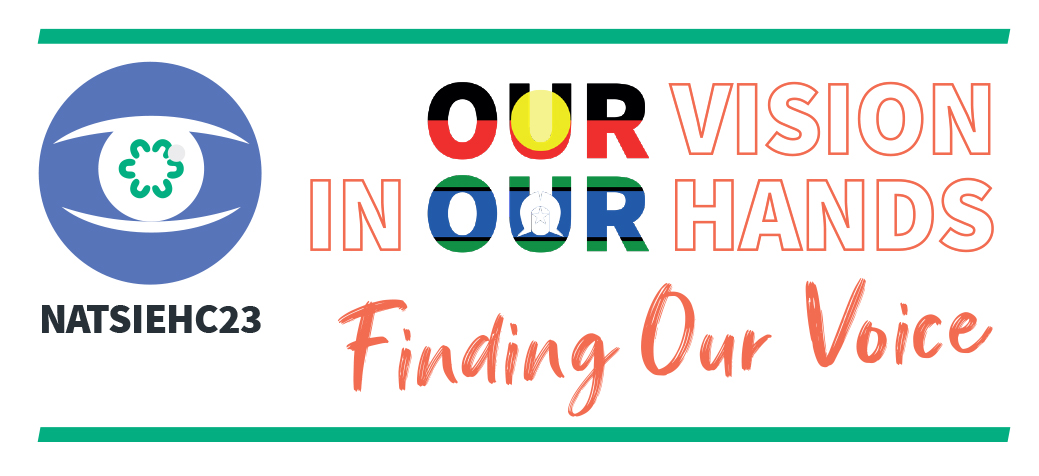
For Aboriginal and Torres Strait Islander delegates the Conference will aim to empower, inform and inspire, enabling First Nations people to lead eye health initiatives designed to improve eye health outcomes in communities. For non-Aboriginal and Torres Strait Islander delegates, the Conference will aim to deliver knowledge, guidance and some practical skills to help shape their contribution to ending avoidable vision loss. This will include advancing conversations about how they, their colleagues and their non-Aboriginal and Torres Strait Islander organisations may reflect and adjust their own approaches to supporting eye care.
Topics of Relevance
Topics should be relevant to Aboriginal and Torres Strait Islander eye health and support the 2023 Conference theme. Topics for abstracts could include: Aboriginal and Torres Strait Islander leadership of eye care; community-led and innovative approaches to improving eye health outcomes; effective commitment, communication, and advocacy in eye care; working collaboratively and interculturally to improve eye health; cultural safety in eye care and in the eye health and vision sector; eye care in the primary health care setting; community and/or cultural engagement initiatives; workforce development; overcoming challenges in coordination and case management; improving outcomes and access to services; health system changes and reform.
If you are interested in presenting your work, please submit your abstract below. The closing date for abstract submission is Friday 3 March 2023.
We hope to see you at the conference and thank you for considering sharing your experience and knowledge.
Key Dates
Abstract submission has been extended by two weeks, and will now close on Friday 17 March
| Call for Abstracts Open | Monday 16 January 2023 |
| Call for Abstracts Close | |
| Acceptance Notification |
Presentation Types
The 2023 Conference will include opportunities for presentation in several formats. Additional details to support preparing your presentations are also provided.
You may indicate your preferred format with your submission. Please note that there are limited spaces available for each type of presentation, and the organisers may propose a different presentation format than proposed by the authors.
- Oral presentation: up to 20 minute presentations, with or without slides.
- Table Top presentation: An opportunity for sharing of information and exchange in a smaller group setting. Each Table Top presentation will be for up to 10 minutes only, including questions and discussion, and repeated in front of changing group of delegates.
- Workshop: suitable for skill-sharing, interaction and practical knowledge exchange, and will be allocated up to 90 minutes.
- New to 2023: Quick Yarn presentation, featuring short, informal yarning presentations (3-5 minutes, First Nations presenters only). See more details below.
- Poster presentation: The conference also welcomes posters, which will be displayed throughout the Conference.
Quick Yarn session: This is a new presentation format, included in the 2023 Conference for the first time. The session aims to support emerging First Nations people working in the sector to share stories, perspectives, and experiences. Each presenter will have up to 5 minutes to share ideas, perspectives, and emerging projects. The Session Chair will also be able to support the presenter by asking previously agreed questions. Please contact us for expressions of interest and with any questions about this session.
Abstracts should be a summary of the presentation with no more than 200 words (not including title and authors).
Submission Instructions
- Please submit an abstract of up to 200 words, and a title (no more than 15 words);
- Please include a short bio for each presenting author (no more than 50 words);
- Please note that abstracts with Aboriginal and/or Torres Strait Islander presenting/ co-presenting authors with be prioritised in the program;
- Please indicate whether you prefer to deliver your paper as an Oral, Table Top, Workshop, Quick Yarn, or Poster presentation;
- Please complete an additional submission form for each abstract;
- The deadline for abstracts is Friday 3 March 2023
Abstract submission has been extended by two weeks, and will now close on Friday 17 March
For questions, additional information, or support with your submission, please contact us at Indigenous-EyeHealth@unimelb.edu.au
Conference Theme
The theme for this year's Conference is Our Vision in Our Hands: Finding Our Voice, representing Aboriginal and Torres Strait Islander leadership and ownership of eye health, and linking the work of the sector with the broader movements for self-determination and centring First Nations voices.

Background: The Conference theme for 2023 has been set by the National Experts Group for Aboriginal and Torres Strait Islander Eye Health (NEGATSIEH), which contributes to the Conference Leadership Group overseeing the conference. The theme builds on last year’s conference, which first introduced Our Vision in Our Hands as a Conference theme.
This year’s addition, Finding Our Voice, seeks to highlight emerging and future First Nations leaders of the sector, while also resonating the strength and values of the longstanding movement for Aboriginal and Torres Strait Islander self-determination in health, and the broader current national movement to enshrine First Nations voice to parliament.
The theme invites consideration of how best to approach efforts to end avoidable vision loss and blindness. It calls for increasing support for the emerging First Nations leadership in the sector, and ownership of eye health by Aboriginal and Torres Strait Islander people along with the shift in power that is necessary to produce the outcomes that we are all working towards.
The activities delivered as part of this theme will support the sector to purposely move towards assuming the roles that are required to advance eye health outcomes for Australia’s First Peoples, and make the necessary connections between self-determination, political representation, voice, and health.
For Aboriginal and Torres Strait Islander delegates the conference will aim to empower, inform and inspire, enabling First Nations people to play a key role in leading the eye health initiatives designed to improve eye health outcomes in their communities. For non-Aboriginal and Torres Strait Islander delegates, the Conference will aim to deliver knowledge, guidance and some practical skills to help shape their future contribution to ending avoidable blindness. This will include seeding some early ideas on how they, their colleagues and their non-Aboriginal and Torres Strait Islander organisations may wish to begin adjusting their approaches to supporting eye care. The goal is to permeate the thinking across all levels of the sector from the national policy landscape to funding bodies, service providers and the communities themselves.
Sponsorship Prospectus
In 2023, for the first time, the Conference Leadership Group of the National Aboriginal and Torres Strait Islander Eye Health Conference is inviting expressions of interest for Conference sponsorship. Please note that expressions of interest for sponsorship are by invitation only.
The Indigenous Eye Health Unit has provided support since the inaugural national Conference in 2017. The Conference is now moving to an Aboriginal and Torres Strait Islander controlled event, and sponsorship is necessary to provide for future events.
The Conference has transitioned to a First Nations – led event from the 2022 Conference. This year, the National Experts Group for Aboriginal and Torres Strait Islander Eye Health (NEGASIEH), which contributes to the Conference Leadership Group, has asked the sector to explore ways to ensure this important annual Conference remains viable. This is the practical application of the 2023 Conference theme, ‘Our Vision in our Hands: Finding Our Voice’, onto the organisation approach of the Conference itself.
Sponsorship of NATSIEHC23 will help support First Nations self-determination in eye care, and will ensure that this important annual event continues in future years, in Aboriginal and Torres Strait Islander hands.
Sponsorships will also support Aboriginal and Torres Strait Islander delegates from across Australia to attend this important gathering.
For more information about Conference sponsorship, please see below.
Please contact indigenous-eyehealth@unimelb.edu.au for any queries.
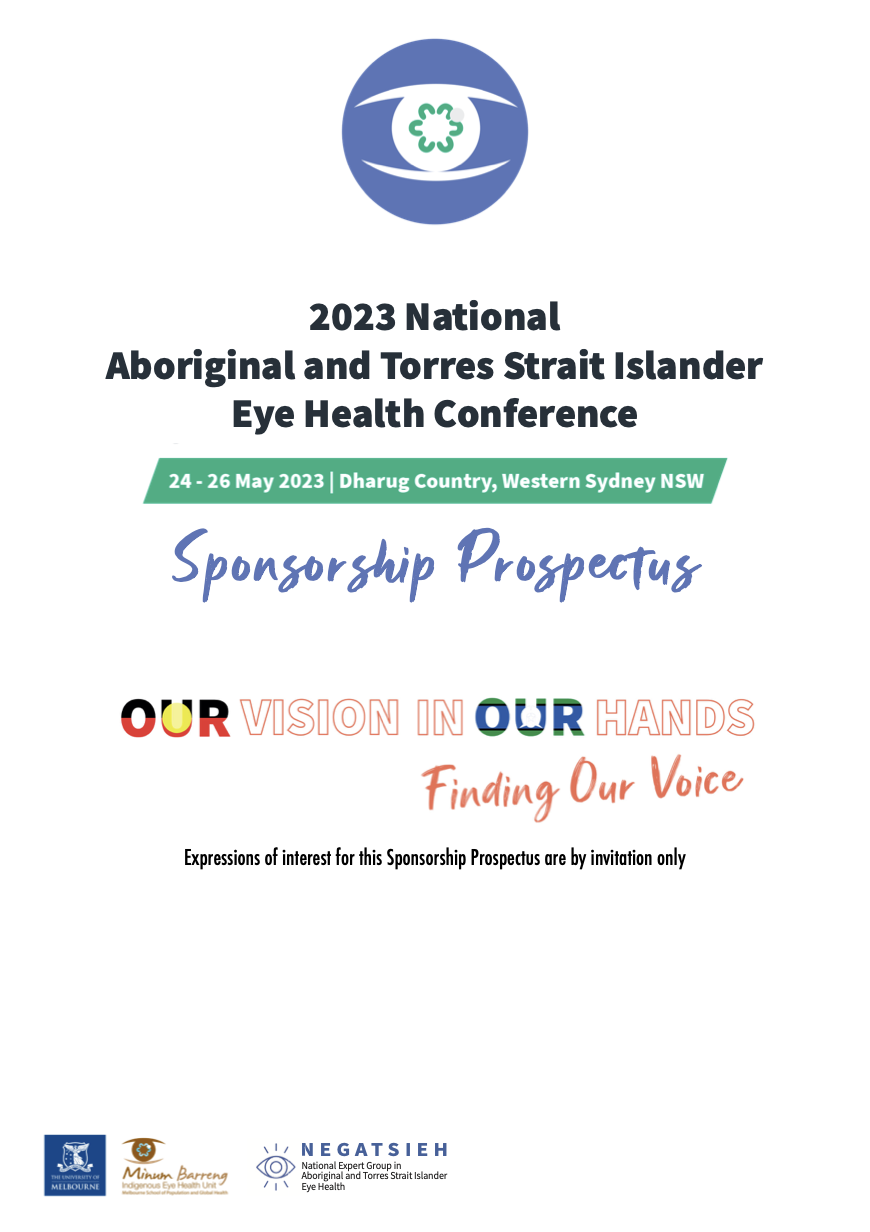
Bursaries
Bursary applications
Applications for bursaries are now open to support First Nations delegates to attend the 2023 National Aboriginal and Torres Strait Islander Eye Health Conference (NATSIEHC23), on Dharug Land in Western Sydney, 24-26 May, 2023.
Who are bursaries intended for?
Bursaries are intended to support First Nations People to be able to attend and participate in this exciting annual sector gathering. Applications are not limited to those currently working in and around eye care, and we encourage students and other interested community members to consider applying for this unique opportunity.
Key selection criteria:
- Aboriginal and/ or Torres Strait Islander People with interest in eye health.
- Priority may be given to students, Aboriginal Health Workers and Practitioners, and those working for Aboriginal Community Controlled Health Services.
What do bursaries include?
Bursaries cover full Conference registration, transport and accommodation as required. Bursaries are not offered as set amount.
Who administers the bursaries?
Bursaries are distributed by organisers of NATSIEHC23, in a process led by the National Experts Group on Aboriginal and Torres Strait Islander Eye Health (NEGATSIEH) and supported by the Indigenous Eye Health Unit (IEHU) at The University of Melbourne.
Funding for bursaries are kindly enabled through the generous contributions of Conference Sponsors and IEHU.
Are there any conditions associated?
The successful applicant will be asked to complete a survey detailing their experience at the conference and work. Successful applicants will also be required to attend a photo opportunity with sponsors, to be published in communications related to the Conference.
Bursary applications close Friday 31 March.
To apply, please complete the online form below.
Terms and Conditions
TERMS & CONDITIONS OF ENTRY TO: The 2023 National Aboriginal and Torres Strait Islander Eye Health Conference (NATSIEHC23)
You're entering this 'Event' constitutes your acceptance of all the terms and conditions listed below only upon which entry is granted.
- Entry to the venue is at your own risk and is subject to the terms and conditions of the host venue
- The University of Melbourne and its agents reserves the right to refuse admission and to remove persons from the venue for any reason including behaviour likely to cause damage, nuisance or annoyance of for failure to comply with the reasonable requests of The University of Melbourne or its representatives staffing the Event
- Smoking and using e-cigarettes: Smoking is banned within 4 metres of a pedestrian entrance to or exit from a public building in NSW. This law is called the ‘4 metre law’ under the Smoke-free Environment Act 2000
- Helium Balloons, Incendiary devices (Flares, fireworks, and smoke bombs) are not permitted into the venue and any person in possession of such articles may be refused entry or ejected
- No Weapons of any type are permitted in the venue and any person in possession of such articles may be refused entry or ejected
- No Banners / Poles or similar are allowed into the venue
- No bags / large items that cannot be placed under your seat are permitted into the venue
- The University of Melbourne and its security personnel may conduct security and or bag searches to ensure the safety of persons at the Event. Failure to consent or submit to an inspection may result in denial of entry
- Illegal substances are strictly prohibited from the Event
- No animals will be admitted into the venue (service animals exempt)
- No unauthorised trading is permitted within the venue or venue grounds
- No unauthorised recording or photography is permitted at this event without prior permission from the University of Melbourne
- The University of Melbourne is recording and photographing the Event. Your attendance at the Event shall constitute your approval for inclusion within the photography, filming and audio recording and your approval permission for The University of Melbourne to make full use of the images, recordings and the footage was taken without any recourse to you.The University may use, copy, publish, make available, distribute, transmit, perform, display, edit or modify the images, recordings and the footage anywhere in the world, but only for the purposes of academic, teaching and research activities (including the creation of online courses); promotion and marketing (including of the University and courses provided by the University and its content partners and use of images on Imagebank); reporting and journalism; and knowledge transfer (Permitted Purposes). You are not entitled to any royalties, fees or other compensation in return for any utilisation of the images, recordings and the footage permitted by this. Should you wish to opt out of this inclusion you must speak with a University of Melbourne staff member prior to entry
- The University of Melbourne, its employees and agents are not responsible for any loss, injury or damage, howsoever caused, to you except where any such loss, injury or damage is caused by the negligence of The University, its employees or agents
- In the interests of public safety, The University of Melbourne and its agents reserves the right to request you to leave the venue at any time for safety reasons or immediately after the Event. No admission or re‐admission after the end of the Event
- IN CASE OF EMERGENCY: Please follow all directives of venue & security personnel and staff
- Providing evidence of COVID-19 vaccination is no longer a requirement of event attendance, however the University continues to strongly encourage everyone to stay up to date with their vaccination
- This is a ticketed event, and the tickets are not transferrable
COVID-19 Information
COVID Protocol
All delegates should note that this year’s NATSIEHC is being prepared as an in-person event, in line with NSW Government and the University of Melbourne COVID-19 guidelines and requirements for in-person events.
The University of Melbourne events continue to operate in accordance with COVIDSafe settings and the Conference Leadership Group and Conference organising group is committed to delivering a COVIDSafe event in conjunction with NSW health and government advice.
The NSW Government and the University of Melbourne continues to strongly encourage individuals to remain up to date with their COVID-19 vaccinations, but the University and NSW Health do not require evidence of vaccination to access in-person events.
Please note that we are running an event where Aboriginal and Torres Strait Islander Elders and community members will be in attendance. We ask that you do not attend the 2023 NATSIEHC if you have any COVID-19 symptoms, including a fever, chills or sweats, cough, sore throat, shortness of breath, runny nose, or loss or change in sense of taste or smell – however mild, even if you have a negative rapid antigen test result. IEHU will provide disposable surgical masks for delegates at the registration desk
If you have any further questions or queries, please feel free to contact us: Indigenous-EyeHealth@unimelb.edu.au
Sponsors
We would like to thank our generous sponsors for their vital contributions to The 2023 National Aboriginal and Torres Strait Islander Eye Health Conference.
SILVER: The Fred Hollows Foundation
NATSIEHC23 organisers are pleased to announce the silver-level sponsorship for the 2023 Conference: The Fred Hollows Foundation.
The Fred Hollows Foundation have been partners with the National Conference for a number of years, and their ongoing engagement with the Conference contributes significantly to its success.
The Fred Hollows Foundation other sponsors’ contributions enable organisers to offer the bursaries which are open for applications as of today to support attendance of Aboriginal and Torres Strait Islander delegates. Sponsor contributions will also support the future of this important gathering,
in Aboriginal and Torres Strait Islander hands.

BRONZE: The Royal Australian and New Zealand College of Ophthalmologists (RANZCO)
NATSIEHC23 organisers are pleased to announce the bronze-level sponsorship for the 2023 Conference: The Royal Australian and New Zealand College of Ophthalmologists (RANZCO).
RANZCO have been partners with the National Conference of the sector since 2017.
RANZCO and other sponsors’ contributions will support the future of this important gathering, in Aboriginal and Torres Strait Islander hands. The sponsorship will also help support attendance of Aboriginal and Torres Strait Islander delegates.

Travel & Accommodation
IEHU have been able to secure some hotel discounts and we have information regarding transportation to the venue, please see below.
Venue:
The conference will be hosted at Novotel Sydney Parramatta
Location:
350 CHURCH ST, PARRAMATTA NSW 2150, AUSTRALIA.
- CommBank Stadium 0.55km
- Parramatta train station 1.2km
- Sydney City 23.4km
- Sydney Airport 24.7km
Accommodation Options:
| Hotel | Room Type | Rate | Booking Reference |
|---|---|---|---|
| Novotel Sydney Parramatta | Standard Twin (2 Double Beds) or Superior King inc breakfast (single occupancy) | $249.00 | Call: (02) 9630 4999 and quote conference Book before 1/4/23 |
| Holiday Inn Parramatta Hotel | Single King (room only) | $185.00 | Email: reservations@hiparramatta.com and quote conference |
| Single King (inc buffet breakfast and parking) | $209.00 | Email: reservations@hiparramatta.com and quote conference | |
| Twin Single with twin single beds (room only) | $209.00 | Email: reservations@hiparramatta.com and quote conference | |
| Twin Single with twin single beds (inc buffet breakfast and parking) | $239.00 | Email: reservations@hiparramatta.com and quote conference | |
| Meriton Suites Church Street Parramatta | As per website | https://www.meritonsuites.com.au/our-hotels/nsw/western-sydney/church-street/ | |
| Park Royal Parramatta | Superior King (room only) with membership | $305.10 | https://www.panpacific.com/en/hotels-and-resorts/pr-parramatta.html Ph 02 9689 3333 |
Airport Transfers:
EasyGo Airport transfers, provide airport transfers for groups from Sydney Airport to Parramatta CBD.
Anytime Airport Shuttle offer shuttle services to and from Sydney Airport to addresses in Parramatta CBD.
Ready2Go Sydney Airport Shuttle Buses offer private transfers and airport shuttle vans.
Rideshare companies such as Uber and DiDi are available from all terminals at Sydney Airport from the Priority Pick Up Zones.
Taxis are also available from all terminals at Sydney Airport, and if you need assistance, kerbside supervisors can also organise taxis with wheelchair access, five-seaters and maxi taxis for larger groups or station wagons for large amounts of baggage.
Conference Summary
The 2023 National Aboriginal and Torres Strait Islander Eye Health Conference (NATSIEHC23) was held on Dharug Country in Western Sydney from 24th – 26th May. The conference theme ‘Our Vision in Our Hands: Finding Our Voice’ sought to highlight emerging and future First Nations leaders of the sector, while also resonating the strength and values of the longstanding movement for Aboriginal and Torres Strait Islander self-determination in health, and the broader current national movement to enshrine First Nations Voice to parliament.
NATSIEHC23 was the seventh annual, national conference and aimed to build on the collective work of the Aboriginal and Torres Strait Islander health sector to improve eye health access and outcomes for First Nations Australians. The conference was led by the National Expert Group in Aboriginal and Torres Strait Islander Eye Health (NEGATSIEH) and co-hosted by AH&MRC (Aboriginal Health and Medical Research Council, NSW).
Over 240 delegates attended the conference from all states and territories – this included over 100 First Nations delegates. Three days and over 50 presentations provided opportunity for connection and a rich sharing of wisdom and learnings. Delegates included representatives from Aboriginal Community Controlled Health Organisations and other primary care service providers, eye care clinicians, policy makers, researchers, non-government organisations, hospitals, professional peak bodies and government departments from across the country.
There were many highlights, and it is difficult to only mention a few. On the first day, there was a welcome reception held outside the hotel in the park and in glorious sunshine. The beautiful Welcome to Country from Peta Strachan (Booroberongal of the Dharug Nation), smoking ceremony and dance performed by the Jannawai dance clan was enjoyed by delegates. The strong Aboriginal and Torres Strait Islander leadership throughout the conference is reflected in the quote: ”we want to advance things for our communities, our families and that’s why we’re presenting today - that is the First Nations Eye Health Alliance”.
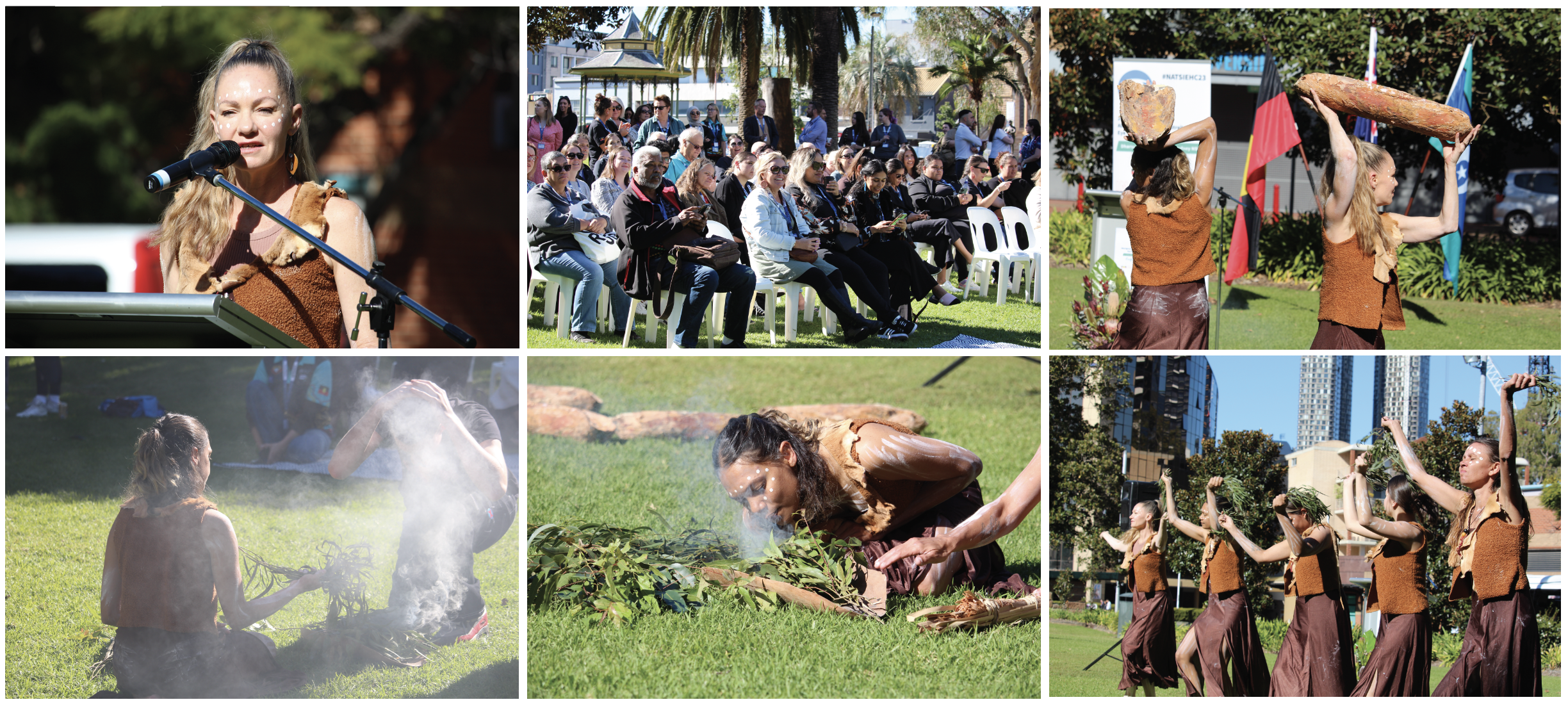
Image: Welcome Reception; Welcome to Country, Smoking Ceremony and dances performed by Jannawi Dance Clan
Kane Ellis, of the Illawarra Aboriginal Medical Service opened day two in Aunty Pat Anderson’s absence, and he referred to the upcoming referendum for constitutional change to enshrine the Voice to parliament. Anne-Marie Banfield, co-chair of NEGATSIEH, introduced the newly appointed First Nations Eye Health Alliance (FNEHA) board and facilitated a panel discussion about the aims of the Alliance. Donna Murray, a Wiradjuri and Wonnarua woman and CEO of IAHA, spoke about designing a future of our own design in the first key note presentation. Lauren Hutchinson spoke from the heart in delivering a beautiful Jilpia Nappaljari Jones Oration. Karl Briscoe, CEO of NAATSIHWP, challenged us on workforce and demonstrated cultural load. The first international key note for NATSIEHC was presented by Renata Watene from Aotearoa who proposed the significant value in First Nations peoples working together on eye care. There was great feedback about the Gala dinner with the wonderful entertainment, venue and awards recognising such stellar work out in the field.

Image: (L-R) Kane Ellis, Donna Murray, Lauren Hutchinson, Karl Briscoe, Renata Watene and Uncle 'Widdy' Welsh

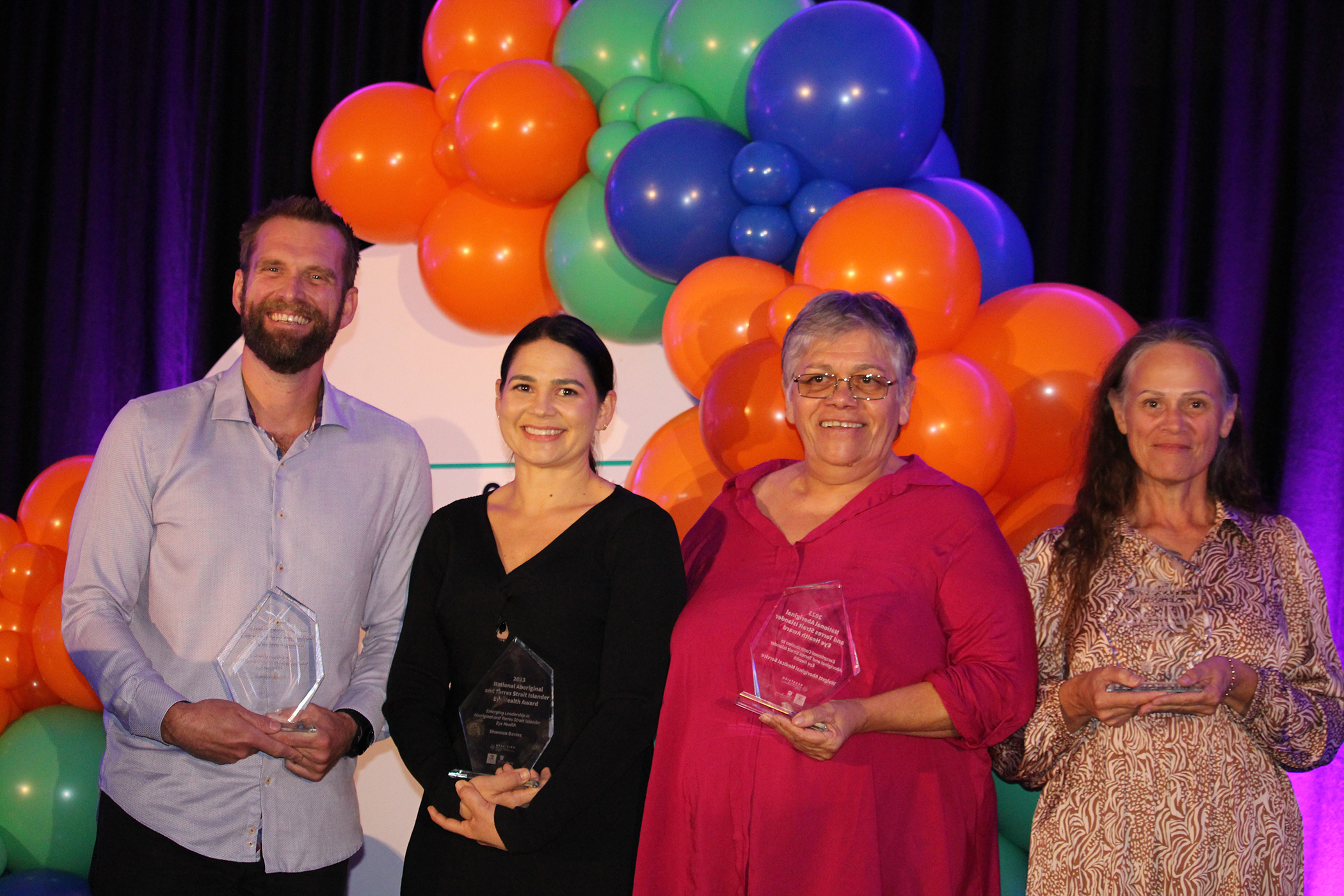
Images: Gala Dinner entertainment; Eric Avery, KebiKub and Blanche, and The 2023 National Aboriginal and Torres Strait Islander Eye Health Award recipients
On National Sorry Day we heard from Uncle ‘Widdy’ Welsh (no. 36) with his heart breaking story as a survivor of the Kinchela Boys Home. Our hope was subsequently uplifted with IAHA student trainees talking about their experiences at the conference and plans for the future.
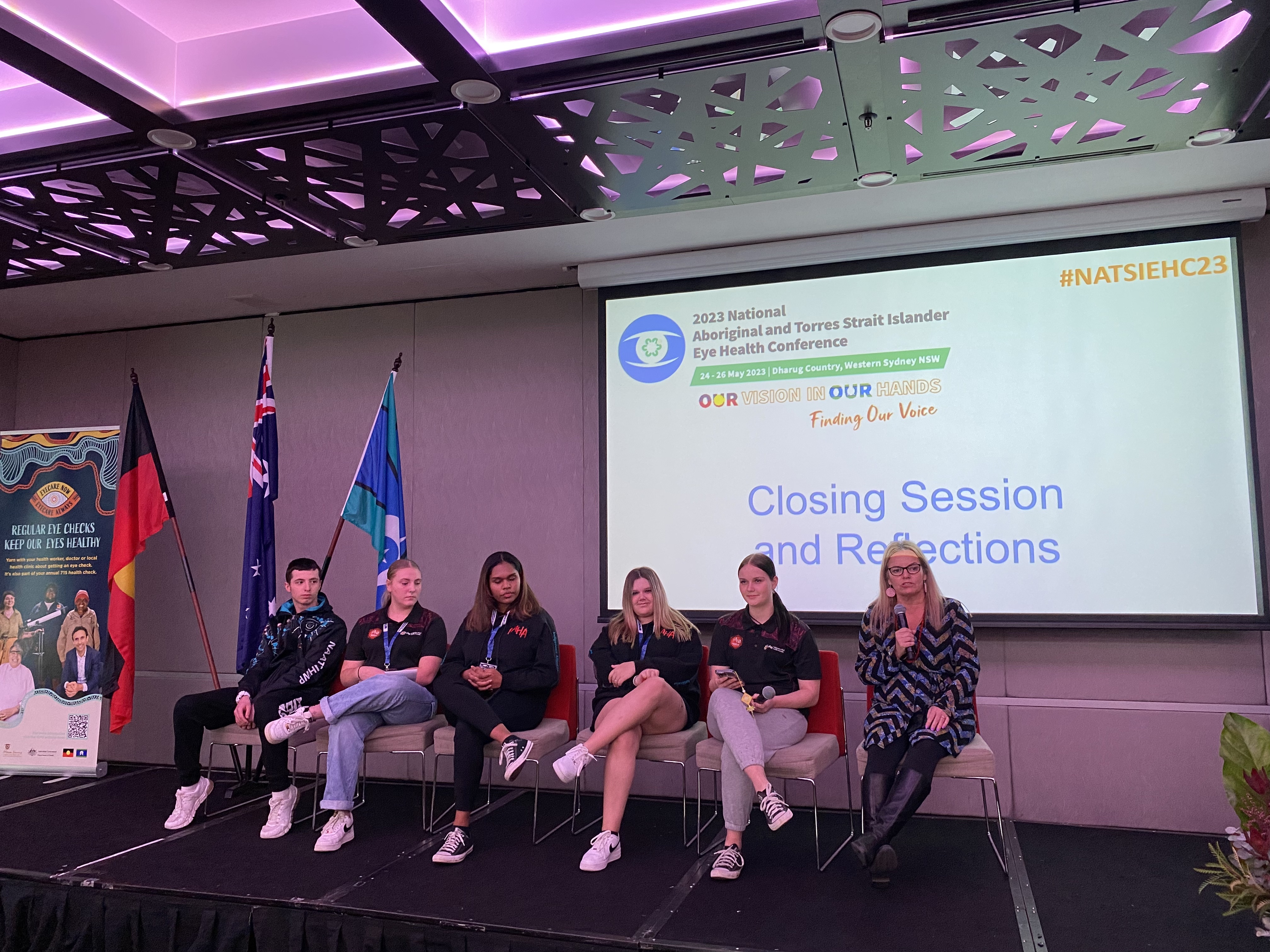
Image: IAHA students presenting for the first time
Shaun Tatipata, after all his hard work during the conference as MC and co-chair of NEGATSIEH, was able to break the exciting news about the 2024 national conference is planned for nipaluna, lutruwita (Hobart, Tasmania).
We would like to thank our sponsors the Fred Hollows Foundation, RANZCO and others organisations who provided direct and indirect support for the conference and delegates.
A special thanks go to all of those involved in organising and delivering the conference; well done and thank you also to all the presenters – together we enjoyed a triumphant NATSIEHC23!
